#the fascist can have his cake and eat it too but it's too much to ask that for anyone else
Text
I have no idea where I am going with this, and this is not going to be a long post, but the thought just kinda came into my head last night and I need to write it somewhere.
There is a really weird...I don't know if dissonance is the right word, but a really weird something going on with who is given the time to have redeeming traits and who is not, especially in TCW. Like I know that Anakin is the main character of the prequel era, and I know that it is more than natural to focus on him, but the show just lacks in how it cares about anyone else, and who is allowed to have more of them shown and who the audience is allowed to have the time to care about. Like, Anakin is, of course, given the time to have his good and bad traits shown, he is allowed to be redeemed by this framing of the story, and people will write whole essays in his defense.
Then let's take someone like Fox (and this is not about fanon or his portrayal in the fanon, this is solely about what is shown on screen), who is given very little screen time, which is natural. He is one of the many, many very minor characters of the show. He gets a lot more than the majority of the clones, he gets to be named on screen and have some semblance of a personality. And we are shown him doing...nothing really bad? 90 percent of the time the things he does on screen are aggressively neutral in the context. Shooting Fives? That can be argued to be a bad thing, but we don't know if he did it because he was ordered to, because he was manipulated or controlled, or because he's just a trigger happy bastard. We don't know.
But still, the overwhelming majority of the fans absolutely detest him like he personally murdered their entire family, kicked their puppy and ate their goldfish raw in front of them. And this is because we are not given even one scene that shows anything else about him, be it good or bad, and the absence of the former is what makes all of his arguably neutral actions look bad. Because if there is nothing good, then it means that everything is bad. Fox isn't the one who turned fascist, but fans of the show still celebrate his murder by the one who did turn fascist.
Then we can take someone like Dogma, who does...you know, things that are again neutral in context. I'm not saying that he is necessarily right, or that others in the Umbara arc are wrong for their actions, but Dogma is someone who was raised in an extremely isolated environment where they were told that they need to obey and are only meant to be soldiers. But the other clones did differently so why didn't Dogma- because they are individuals. The whole show is about them being individuals. People respond to their surroundings and trauma very differently. Dogma got where the others were a little bit later. He, at least, got given the time to do the good thing in the eyes of the audience- and there he goes. Removed from the narrative, never to be mentioned again. Now back to the future fascist who puts his droid above the lives of his men being shown to be also good for seven seasons!
I don't know. Something about this just kinda rubs me the wrong way. I don't know what it is.
Why is Anakin suddenly likeable too cool for school instead of being a a wet scrunkly with anger issues OH because he can't be shown to have the profile of a serial killer because that would make him look bad ohhhhhhhh-
#just a thought you know#the fascist can have his cake and eat it too but it's too much to ask that for anyone else#for their much much smaller crimes#star wars#this is not an anti-anakin post but it is anakin critical#which is you know#THE WAY HE IS SUPPOSED TO BE VIEWED#anakin skywalker#commander fox#clone trooper dogma#tcw dogma#the clone wars#tcw
22 notes
·
View notes
Note
The one "positive" from MHA is... That it made me apreciate SE in comparison lol, hell even the mangas awful copout ending atleast was memorable in how bad, disgusting and rushed it was - in MHA it just feels like nothing, not even giving us those rushed redemptions - nah even that is too much for Hori, so lets just give the old "dead equals redemption" trope which is as lazy as it is cowardly - atleast Crona got the hope of getting bailed out of jail, and the society actually changed, even if unrealistically, with the witches truce - while in MHA the whole buildup of "maybe this society is bad, maybe heros shouldnt be worshiped, maybe civilians should not be infantalized and depowered and shouldnt just rely on fascists supercops when they literally have their own powers, maybe the villians should be integrated and understood...."- nah, they are all evil psychos, lets stigmatize mentall ilness as being violent...
It really was reduced to "one evil baby is at fault, so if we use our flashy moves and kill it, everything will go back to normal" - but no Hori then trys to have his cake and eat it too by trying to force the whole meta "actually live doesnt return to normal after a war!" - but it kinda does, besides the Endeavour misery porn which doesnt work after he got retconed to not be evil - because that is what happened and why it does feel weird when Natsou disowns him - because that would have worked with the og Endevour, showing that a redemption arc isn't enough and some scars will never heal and he has to accept it and repent for the rest of his life - but after it getting changed that Toya was unhinged from the start and Endy was just kinda bad at communicating...
Man I ranted a lot longer than I thought, apologys for that, MHA is just so bad that it happens
I debated whether to post this now or wait until Chapter 426 of My Hero Academia comes out on Sunday, given how many spoilers there are in my answer and in the question itself.
But I would rather get the answer out now instead of letting it fester, especially as I’m guessing this will not be the last time I respond to this chapter, this extended epilogue to the manga, and how the beginning, middle, and end of My Hero Academia worked and didn’t work.
So, screw it, here is my response, and I hope the spoiler tags are enough to prevent people from learning something they weren’t ready to read until Sunday.
The ending, ongoing
A friend of mine had written something similar: it feels like My Hero Academia is ending with a whimper.
The thing is, I have been struggling lately with whether I want something to be ambitious and fail at its own goals, or competent but cliche.
You bring up how Soul Eater had a memorable ending even if it was, let’s be charitable, flawed. I’m not sure I agree, as Soul Eater’s ending was so bad that it’s hard for me to see MHA somehow having a worse ending. You’d need to resurrect Midnight just for a fanservice gag to get things as bad as Soul Eater’s ending.
The comparison I’m grabbing is actually to Fire Force, as it does something similar to MHA: the final battle ends in glorious fashion, then the epilogue we’re dealing with is rushed, unsatisfying, contradicts earlier character beats, and re-stages the setting in a way that is bothersome (Fire Force is revealed to be the Soul Eater prequel no one was asking for; My Hero Academia should be showing life after near global destruction, or at least the destruction of most of Japan, and instead Cementoss is already rebuilding entire cities, so the stakes have evaporated--even if, I’ll admit, once you introduce a character who can do almost anything, that’d be pretty stupid to not have that character still out there single-handedly saving the entire world *cough cough* why is Yosano only with the Agency if she could be healing people of cancer throughout Japan in Bungo Stray Dogs *cough cough*).
Ambitious or Competent?
But to go back to what I said, that I struggle to decide whether I want a story that is ambitious or competent, it’s kind of how I feel comparing Chainsaw Man and Dandadan: I really cannot stand the storytelling direction of the former even as I have to admit it is more audacious and trying to say something really complicated even if I think it is failing at getting that message through to its audience, while the latter in terms of plot, character progression, paneling, character designs, humor, pathos, and dynamic artwork and action is all or mostly expertly crafted but not necessarily groundbreaking (minus the stunning artwork and two-page spreads).
And even then, Dandadan doesn’t get it always correct, where a potentially thought-provoking detail is reduced to a cliche, and often an offensive one at that: the latest chapter as of writing, Chapter 158, takes a complicated idea about mourning the failure to live the dream of a childhood friend…and instead of using that to talk about hyper-sexualization within idol culture and maybe even the magical girl genre, it’s just a really bad joke of an underage girl forced against her will into a revealing outfit to put on a show she does not want to put on but is coerced into doing, and, oh, to keep the author’s exposure kink going, we got to make her a (forgive the insulting phrase) “mousy” girl with pigtails, glasses, and a more reserved personality so that the readers can also enjoy the author’s kink--gross, fuck this shit.
So, do I want My Hero Academia to be competently done even if the ending is cliche, or do I want it to be ambitious even if it can’t quite reach those lofty goals and still ends up with a deflating ending or a confused final message it is trying to give to the audience?
I’ve said before that Shoto Todoroki may work better as the protagonist of his own story. With that idea in mind, and based on your remarks, is it possible that Horikoshi had a very ambitious idea in mind--the tragedy that Endeavor and Dabi both got what they wanted, and the cost ended up making what they got a punishment rather than a victory--but that the kind of story Horikoshi is writing was not suitable for that tale?
I really hate that argument I am proposing, because it makes it sound like the problems are the circumstances of genre (superheroes), demographics (shonen), and the publishing industry (weekly release schedule, etc) that hampered Horikoshi, when the more likely answer is either that Horikoshi just isn’t that good at writing that kind of a story, or that it was never that kind of story he was interested in, or that he succeeded in the story he wanted to tell and I just don’t like the execution or even the message itself.
Too Many Characters?
A common complaint I read online is that My Hero Academia suffers because it has too many characters. I have never been convinced by that argument.
MHA is like a good Pixar film: there is always some group of misfits in the background serving as comedic relief but who also have their own narrative path through the story, whether it is to give those misfits their own path for character progression or, as is more often the case, just a path to show what their characterization has been this whole time.
Think of Gurgle in Finding Nemo when one of his last scenes in the movie is yelling at the Aqua Scum: that’s not showing his character progression, that’s clarifying what his characterization has been this entire time--he is indeed concerned about cleanliness, but even when the Aqua Scum gives him what he has always wanted, that being an absolutely clean tank, he is not overjoyed but horrified because it ruins his buddies’ plans to save Nemo. Gurgle’s characterization was never cleanliness above everything else; his characterization was he wants cleanliness _and_ to keep protecting his friends. That moment is more ironic than anything, as well as the start of his plot, that being, how is he going to save Nemo and fight against the very thing he has always wanted…only that plot never actually starts or reaches a conclusion because the title of the movie if Finding Nemo and other characters such as Gill are the actual protagonists or at least supporting characters that instigate the plot and progress along the way.
That is my long rant about why I don’t really care that Sero and others have limited character moments in this final arc, and why I think it’s silly to say that there are too many characters for Horikoshi to satisfy for all of them.
That being said, that doesn’t mean I don’t think he dropped the ball--because I think he did when it comes to the Todoroki family drama.
Natsu as Audience Surrogate
As I said before, I am struggling to separate my thoughts from just whatever was the last thing I read online. But I can’t ignore what I think people in the Reddit thread got correct, that the final arc centers on Endeavor when the audience also wants the ending to center on Dabi, Shoto, and the rest of their family. It should have been enough to gesture at just enough of Natsu’s education, career, and dating life to give a sense of full characterization--and instead he ends the story still striking me as an accumulation of grievances against Endeavor, and it rings hollow rather than making Natsu our audience surrogate, someone we identify with and agree with and hence can characterize ourselves.
I don’t know--would it have been better to lend less background information to Natsu to make him a better audience avatar? Should he be like a Fire Emblem protagonist or the OC you create in Sonic Forces, just bland enough that you can place yourself in their shoes? I don’t think that’d work either; it’d just make Natsu into a dull protagonist like someone out of a crappy isekai. But at least I’m trying to figure out what went wrong and how to improve on what is already in the story without re-plotting and completely contradicting the messages Horikoshi is trying to deliver.
Move Up Dabi’s Confrontation with His Siblings
As I have also said, maybe I would have enjoyed parts of this final arc if they were not forced into the end of the story, which would mean moving them up to earlier in the story. This again is based on something elliotthezubat and I have been plotting as ideas about how My Hero Academia could have gone, but one idea I had discussed was having Dabi confronting Natsu and Fuyumi earlier and on their own. Between when Dabi puts out the video and when the final war starts, why not have a scene of Dabi sneaking up on Natsu and Fuyumi to confront them?
I know that does not sound realistic, or even believable--I’ll address why that can still work, however, in a moment.
And it disrupts the intended forcefulness of forcing all of the confrontation into one moment of the family trying to freeze Dabi together. But that is my point, forcing all of it at once undermines a lot of the more nuanced details you can pull from the complexities of the sibling relationship. It also would actually let Natsu and Fuyumi say something more meaningful than just repeating what Endeavor and Rei were already yelling at Dabi when trying to kill or freeze him, and it would address what is a repeated complaint in the Reddit thread, that Natsu and Fuyumi say next to nothing to Dabi when they actually face him at the hospital.
As for why this would still work even if it doesn’t seem initially to be that realistic or believable: we already saw Dabi sneaking around to find Toga to deliver Twice’s blood. It is in keeping with his methods and skills that of course he could find some way to get to Natsu and Fuyumi when they are alone. “But aren’t they at the UA fortress?” Then write a way for them to not yet have arrived there; it can’t be any dumber than how they all happened to show up right where Dabi and Endeavor are fighting in the climax.
Make This an Actual War Arc
Having Dabi track and confront Natsu and Fuyumi earlier has the added benefit of making your war arc into an actual war arc. I have complained repeatedly online that the wars in My Hero Academia don’t feel like wars, they feel like one big battle that constitutes the entirety of the so-called war. Wars consist of numerous battles, not just one big battle--and I don’t think MHA did a good job making this all feel like a series of battles leading to anything. It got better when it was Izuku and the Pros finding AFO’s base only to get the video message--that kind of covert work shows greater dimensions of a war beyond just fistfights and explosions.
And that’s why Dabi on his own looking for Natsu and Fuyumi would suit this war arc: it’s a quieter moment of surveillance and covert work, not a major battle.
One thing I never appreciated enough in the Season 1 finale of Justice League was how the World War II scenes are broken up into the various dimensions of war: Green Lantern on the ground with the infantry, Supes and Hawkgirl in aerial combat, but also J’onn and Wonder Woman on their own covert spy missions.
MHA didn’t have enough of the covert spy stuff during the war arc, I anticipate because Horikoshi covered a lot of that before the war kicked off with Hawks infiltrating the PLF. But to not persist with that tone and style of warfare is a missed opportunity and hurts the pace and intensity of the war: we need those quieter moments that a spy story can provide against all the explosions and physical battles.
And it is a good spot where to stage Dabi, Natsu, and Fuyumi airing their grievances now so that we get where they come from in the final confrontations, rather than forcing all of it with limited page space, time, and dialogue to get at how the relationships between them have changed since Toya “died” and since Dabi’s video.
Does Anything in Society Change?
I’m going to quote part of the initial question:
“not even giving us those rushed redemptions - nah even that is too much for Hori, so lets just give the old ‘dead equals redemption’ trope which is as lazy as it is cowardly - atleast Crona got the hope of getting bailed out of jail, and the society actually changed, even if unrealistically, with the witches truce - while in MHA the whole buildup of ‘maybe this society is bad, maybe heros shouldnt be worshiped, maybe civilians should not be infantalized and depowered and shouldnt just rely on fascists supercops when they literally have their own powers, maybe the villians should be integrated and understood....’- nah, they are all evil psychos, lets stigmatize mentall ilness as being violent…”
There is a lot here, so forgive me if I go out of order.
I think the story lost me about any chance of a changed world when it had, to repeat myself, Cementoss already rebuilding entire towns that quickly. As I said, of course that would happen--Cementoss has that power, he is a good person, it would not be pragmatic to do anything else, use every tool you have. But visually and thematically, it says, “Don’t worry about your emotional attachment to your original home and possessions--things are reset back to normal!”
Add to it that the Cementoss moment is on the same page as a useless cameo by Koichi from My Hero Academia: Vigilantes, and I was sour. How do you stage the arrival of a popular enough spinoff character to just have him looking around at everything? You could have just as easily had him as a background gag, where he’s still having the same problems as before, to indicate he really hasn’t progress as a character (because, sorry fans, Koichi never progresses in Vigilantes, that is why the ending to that series is miserable to sit through).
I think I understand your point about “death equal redemption,” as regards maybe Toga, if she is confirmed dead, and Dabi, whenever he finally dies having now given an unearned, barely registering apology to Shoto, as well as Endeavor’s attempted death to stop Dabi that has effectively killed his Pro Hero work and, in a rather disablist fashion, implies that with his injuries he may as well be dead--which is fucked up and offensive, but that could be my misreading, not Horikoshi’s intention or even execution.
I do think that is similar enough to Crona’s willed exile to stop Asura, but I agree, there is the intention by the end of Chapter 113 that Maka will get Crona back--it’s just a matter of how much time and whether Ohkubo will ever wrap up that story (and wrap it up in a way that satisfies enough readers and not piss away continuity, canon, and the lasting message or theme of Soul Eater as a whole).
I don’t know what to make of Horikoshi’s attempts to speak to the problems with Pro Heroes within his fictional setting and as suitable for real-world application to talk about policing and other power structures--because Horikoshi was never consistent. Maybe this would work better if My Hero Academia was split into different series. I hate to suggest the MCU model, as we have seen how that has hurt enough other stories, MHA being one of them. But what if each competing, potentially contradicting message was in its own story, even as they share the same setting? You can have your story about how being a hero, lowercase “h,” rather than a Pro Hero means that you are holding onto the ideals, and how you wrestle with your own failures to hold onto those ideals and need to be more pragmatic or else you burn out your body: that is the point of Izuku’s journey in MHA. Then you can have a spinoff about the dangers of such power structures as like a form of policing and how such structures do violence not only to society and the people injured by police but also to the police themselves: that is Endeavor’s story, and it’d be a hell of a lot better as its own manga so that the full tragedy of what happens to him is not getting in the way of whatever hopeful message Izuku’s story is offering.
Furthermore, for all the praise Endeavor is getting right now, the guy was a bad Pro Hero. In Vigilantes he sends his flames out at random and burns to death a bystander [who turned out to be a villain anyway with a regenerative ability, so no lasting harm done]. During the Sports Festival he was a braggart about his son and burning bridges with All Might instead of focusing on collaborative efforts--something that then harms the mission to save Bakugo. His fixation on handling missions faster than his sidekicks fails to train them as effectively as he could, and it risks exhausting his body and attention, something that already happened against the Nomu, which he is still recovering from, and will persist when trying to save Natsu from Ending and stopping AFO. All of that works in terms of characterization, just not when the readers keep insisting he is a great Pro Hero and a great hero when the story is actively showing you he is not, and even Horikoshi is hammering this point when the only reason Endeavor got to be Number 1 is because All Might retired: Endeavor was a good enough Pro Hero, but he wasn’t a good Pro Hero or even a good hhero, if that makes sense.
You point out how the story seemed like it would go in the direction of presenting a message that heroes should not be worshipped. I have to agree that this detail falls apart within the story, as Izuku still, correctly or not, gets praise for what he accomplishes: the hero worship has not ended. But I do think the story can still stick this landing if we see Izuku does serve as inspiration that people take on agency themselves to help others rather than waiting for someone else to handle it.
You point out how the Pro Heroes are presented as akin to “fascists” and “supercops.” I think Horikoshi even backpedals on this point, getting close to the idea but refusing to commit to it. Endeavor is already one example I gave above. We can also take examples of Mount Lady and other seemingly selfish Pro Heroes--who are later shown to have actually decent reasons for their actions, understandable ones, defensible ones, or just pragmatic ones that are more so indictments against the system rather than only the individuals within it.
Why is Mount Lady a glory hound? Her Pro Hero work does enough collateral damage that she has to offset that bad impression by making a good impression on people, which means she also has to do even more Pro Hero work to pay for the damage she causes and to get better insurance coverage as she keeps losing providers because of the damage she is doing, putting her into a viscous cycle of having to get more fame to pay for damage she causes but which itself causes more damage that she then has to get more fame to pay for and on an on: she is a victim of her own success because the system does not make best use of her abilities. Granted, maybe she should have stayed in her rural hometown where she couldn’t cause as much damage--but that’s also a waste of the talents she can offer across Japan, as she can get around faster by her size and is useful when dealing with rescues from tall urban buildings. And granted, a lot of what I said is based on gag comics and encyclopedic information that should have been in the text itself, otherwise Mount Lady’s progression comes across as lazy: she goes from showboat to serious fighter in Kamino to giving useful advice to the students without a hint of self-absorption.
Society’s Fault or AFO’s?
I question how much of my problems with MHA are because I am asking the story to hit me over the head with its message and that I’m not practicing enough close reading skills to get the nuanced message it is offering, and how much of the problem is because Horikoshi is bad at this. AFO being responsible for so much misery should be fine because it does not detract from the responsibility Nana, her son, All Might, Gran Torino, bystanders, Endeavor, and others had for how Shigaraki was abandoned, Toga was suppressed, Spinner was ostracized, and Toya “died.” The problem is also that it is too coincidental even for a supposed galaxy brain-tier villain like AFO to account for all possibilities, at least with Shigaraki. Add to it how offputting it was for the story to need narration to literally spell out that AFO was always this bad since birth--no, that is not how babies work, they are not born bad, why is it now that the story is hitting me over the head with a message and one that is not believable? It’s not as if this could not work: show that Yoichi and AFO were taken in a few times since they were babies, hence each time was a chance for AFO to grow up and learn to work with others--and instead AFO got possessive and killed them all except Yoichi. Yes, that is still offputting that a child would be that lethal, but it also shows that he has been given chances over and over again--he was not born evil, he just refused to learn to live with others and that allowed him to be evil.
Endeavor and Wrapping Up
And I still didn’t tackle how the manga seems to retcon some details. As you point out, the conflict now comes across more as Endeavor being bad at communicating to Toya. And while the manga makes it clear that Endeavor’s bad communication with Toya doesn’t ameliorate the facts that he was practically buying Rei from her parents, hit her, hit Shoto, indirectly led to Rei scarring Rei, and indirectly led to Dabi leaving burns and scars on his mother and siblings, it is difficult to read this less as a complication for the character so that we see his tragedy and more as a late attempt to make him more endearing and sympathetic rather than maintaining his guilt. It’s as bad as the late revelation that all of this is inspired by Endeavor’s dad dying trying to save a child--something that should be poetic or thematically appropriate, that Endeavor’s dad died trying to do something he thought would help but only ended with both parties dead and a child without a parent, and Endeavor’s work to be a better hero did little initially to help society to prevent another father from dying and only stopped AFO after numerous failings ruined the lives of his wife and children--and even that victory fell apart because Endeavor didn’t stop AFO or even Dabi, it was Bakugo killing a child, then Izuku screwing up and letting AFO back, and the family having to contain Dabi. It’s a muddled mess where I don’t know what the point to any of this was except, “Endeavor must suffer,” and instead of that being cathartic or a lesson, it’s just a confusing mess.
I’ll wrap up there for now.
There’s more I want to say about Endeavor, but I think I touched upon the basics of how I would have responded to your point: Endeavor’s tale should be a tragedy, but that message is in conflict with the message we get from the stories of Izuku and everyone else, so, if Horikoshi wanted to get that message across, it would have been better as its own series running parallel to the initial My Hero Academia manga. But that was not going to happen without Horikoshi taking a slower pace or sharing art and writing with someone else. I mean, it sort of worked for some of Bungo Stray Dogs to farm out some of its art to other illustrators…
4 notes
·
View notes
Text
Shitty Luca Movie Recap, Episode 4
Can’t Watch Nina, Even For Luca?
Don’t Worry, Me Neither. Goodbye.
.
..
...
Ok, fine, I’ll talk about the damn thing.
So it’s a warm September night, and I’m in the mood for a Luca Marinelli feature. In my infinite wisdom I choose Nina. “It’s directed by a woman,” I reason, “and women know what’s up.” ‘What’s up’ in this particular case is code for ‘how to frame beautiful men for the female gaze’. Because women can be auteurs, too, and being an auteur means making movies about your own personal wank material.
Turns out, sometimes a woman’s wank material consists less of a gorgeous male form and more of fascist architecture. We’ll discuss the former in due time, but for now, what’s Nina even about? Well, at its core it’s a simple story about a young woman who doesn’t know what she wants, set against the backdrop of the Rome that is almost entirely empty due to most people leaving for the summer. This could have been a fairly straightforward coming-of-age film, but Nina is too indie and up its own ass for that. Literally nothing of note happens in this movie, and it’s all long static wide shots of empty streets, endless stairs, and domineering largeness of Rome’s most famous fascist buildings such as the Palace of Italian Civilization, the Sapienza University of Rome, Palazzo dei Congressi, and, most prominently, the Fountains Hall. (Google what they look like if you don’t know.) Now, I’m guessing those locations weren’t chosen by accident. They could have easily added to the creepiness of the movie — and I’m assuming creepiness was intended; otherwise how do you explain these hoverboarding nuns?

Anyway, the employment of the locations could have been atmospheric and thematic had the shots not been so bland. But they are. Bland, flat, and always looking the same no matter what is happening in the scene. Usually audiences are willing to sit through slow uneventful movies because of interesting visuals or characters worthy of attention, but Nina has neither. The titular character herself is tedious. Even her bad fashion sense is bad in a boring way that doesn’t tell you anything about her. Is she stuck in perpetual adolescence? Is she searching to get in touch with her sensuality? Who knows. The only thing I’m certain of is that she needs to learn to tuck her tops into her bottoms.
Nina spends her days giving singing lessons, going to Chinese calligraphy classes, eating cake, exercising and taking midnight walks in the empty city. She wants to go to China in September — it’s the closest thing to a goal she has — yet she’s done no preparations, and instead of learning Mandarin she’s studying calligraphy. And she’s real bad at it, too.
There are reoccurring visual elements in the movie besides the vast emptiness: stairs, white columns, a jogger, a red dress, animals… You’d think those were very straightforward symbols, but they’re used too sporadically and inconsistently to hold any meaning. For example, animals. Nina is tasked with both helping out in a pet store and house-sitting an apartment with a German shepherd (a good boy named Homer), a guinea pig and a tank full of fish. The instructions she’s given are absurd, like feeding the dog sleeping pills and putting the guinea pig on a diet. And then there’s a supposedly American TV show always playing in and out of diegesis about dogs living in cages and swimming happily in pools, and it looks and sounds like a video off the political section on the dog version of YouTube. It contains timeless classics like “You are a dog born in the age of consumerism” and “Depression is an evil illness now spreading amongst dogs of every breed, dogs belonging to every social class.” The butter commercial from Crazy Ex-Girlfriend could never. And I wish the whole movie was as surreal as this TV program but unfortunately it’s as bland and directionless as Nina herself.
And boy is it directionless. There aren’t any subplots in the movie, no cause and effect, no acts, no structure, no flow; only scenes that happen, and I can’t even find any reasons for the order in which they happen. The scenes also don’t start or end; they just interrupt each other, not leaving any emotional impact. For example, there’s a scene where Nina sees her future self. She’s on one of those midnight walks with the good boy Homer when she sees a couple being romantic. The woman is wearing a long red dress, and the man is in all black. The shot is wide, so it’s impossible to see their faces, but the woman is obviously Nina:

And the man is definitely Luca. I recognized his ass. I’m not joking, guys. It’s his ass:
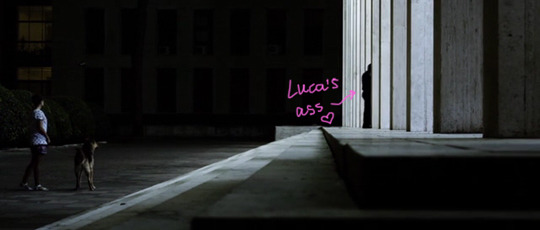
Also I was later directed to the website of the photographer who took the set photos, and yes, it’s Nina and Luca.
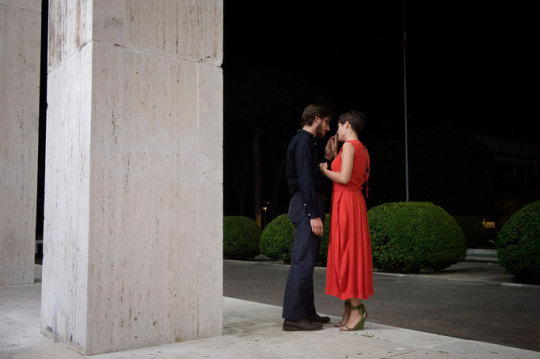
I never forget an ass.
Anyway, Nina, who at this point hasn’t properly met Luca’s character, Fabrizio, sees herself from the future acting romantic with him, and doesn’t react. We don’t even know if she recognizes herself or him or whether it’s even a real scene or a dream. How are we supposed to empathize with a heroine who isn’t allowed to react to her environment?
Whatever, it’s time to talk about Fabrizio. He plays the cello and he’s obnoxious. That’s it. He first appears as a patron of Caffé Palombini, the real-world café Nina frequents (and buys her cakes at). She’s drinking her usual milk shake and reading. At some point, their eyes meet, but neither says anything, and then Nina gets up and runs after the good boy Homer who decided to take a little stroll by himself. She leaves all her things behind: her milk shake, her handbag, at least three books, a whole stack of paper for calligraphy, and her diary. It’s obvious she’s going to come back as soon as she gets the dog. And yet before her feet are even out of frame, Fabrizio gets up, goes to her table and fucking steals her diary!
His next several appearances are random and sporadic, and it looks like he’s stalking Nina, but by the time of his first actual scene she is following him for some reason. Obviously, he can’t let a woman outcreep him, so he ambushes her:
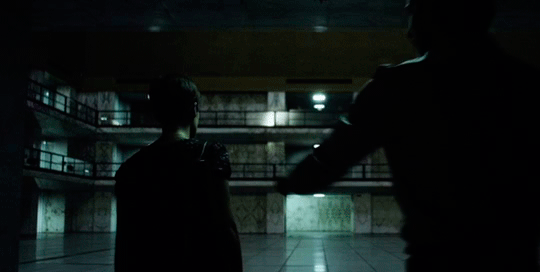
He tells her blankly, “You’re following me,” but I think this scene deserves better dialogue. Thankfully, we have a whole well of predator/maiden media to pull from.
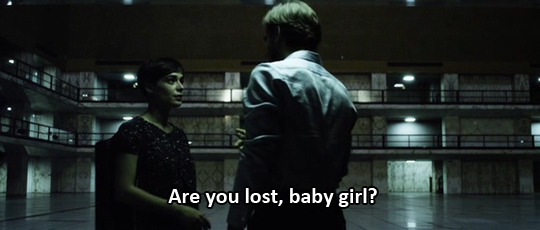
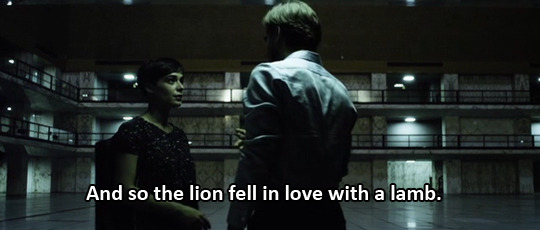
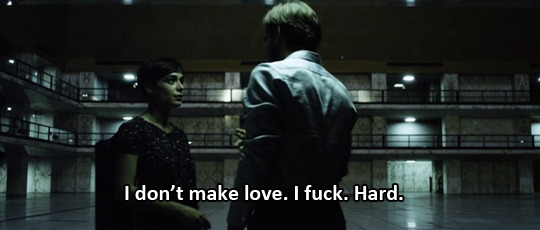
Though I personally believe this is the most appropriate line:
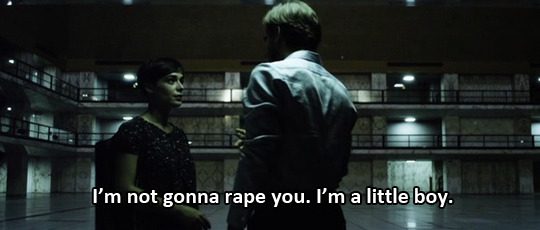
Fabrizio lets Nina know he has her diary in the dickiest way possible: he quotes from it to let her know that he’s read it. He then informs her that he’ll only give it back to her if she continues following him. And it’s not blackmail; “it’s an agreement.” What an asshole! I’m weeping for the dignified cuckoldry of Joseph.
And what was the purpose of that “agreement” plot point if the next time they meet is by chance? Quirky love interest writing, duh. So quirky that the accidental meeting happens when Nina is walking past a phone booth where Fabrizio is… doing a phone prank? I don’t know, I got nothing. Anyway, he’s annoyed their meeting is unintentional on Nina’s part, but he returns her diary, and I guess they start dating? He watches her sing once with what could only be described as a complete absence of emotions:
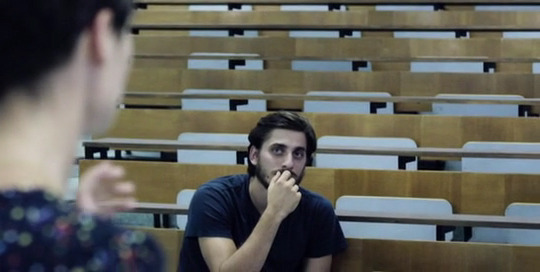
In the next scene she watches him play the cello after which they go on a date. Nina is wearing the red dress from the vision, but Fabrizio’s shirt is different. I fucking give up.
Their next (second?) date is a romantic dinner on Nina’s roof, and they’re dancing for entirely too long. She then tells him she’s scared of how much she’s enjoying his company, gives him a ridiculously chaste kiss goodnight and… completely ghosts him afterwards. And if you didn’t dislike Fabrizio before, you will now as he starts calling Nina at ungodly hours (including 5:30 am) and leaving her very whiny and increasingly more passive-aggressive, entitled, and accusatory voicemails. At some point he even leaves a voicemail for the fucking dog! He’s like, “Homer, I’m worried, meet me at the café.” Again, quirky love interest writing: extortion, phone pranks and a voicemail for a dog.
Fabrizio then lets Nina know he’ll be leaving town in three days in case she’d like to see him one last time or whatever. And she never fucking does! In any other movie she’d be chasing through the airport, but here she just drops him like he’s a well-tucked shirt! She tells the kid she’s befriended (she hangs out with an eleven-year-old boy the whole movie, don’t worry about it) that she’s afraid to be “like everyone else”, with a job and a boyfriend, so she doesn’t even say goodbye to Fabrizio. At some point she goes for a walk with the good boy Homer, and Fabrizio is also there, and they just miss each other. Even fate isn’t interested in that romance.
And then all the fascist buildings get covered in gigantic paper figurines, and the red-dressed Nina runs into Fabrizio’s arms. Because of course.
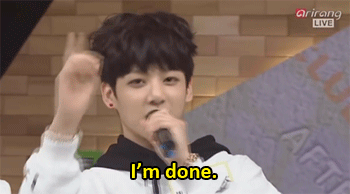
Nina is one of those movies where the main theme — a struggle to grow up — is obvious, but the rest of the elements are a mess only the writer-director could decipher. And I don’t really care. Again, I had to read Japanese postmodernists at university. What I do care about is the male form I mentioned at the start. I know I have no one but myself to blame for my expectations of how the director should have framed Luca’s body or face, but it’s one thing to frame him blandly and a completely different thing to isolate him as the only character (or actor) she’s deeply uninterested in filming competently. Everyone else in the movie gets their fair share of close-ups and decent lighting whilst Luca — whose name is literally second in the credits — gets, um, neglected.
This is his introduction:
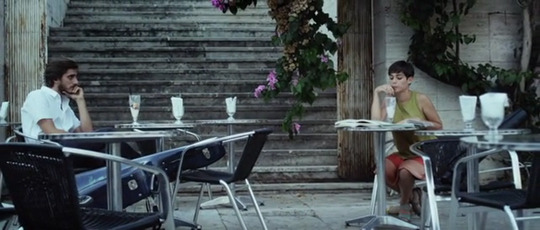
These are literally all his close-ups:
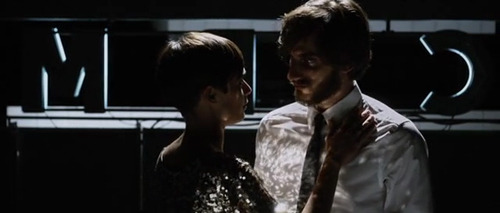
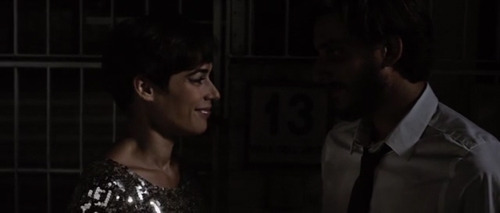
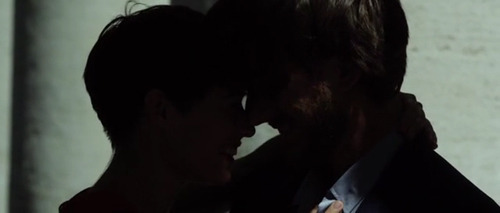
Should I even count this last one? What’s with the lighting? Like, this is as well-lit as his face gets:
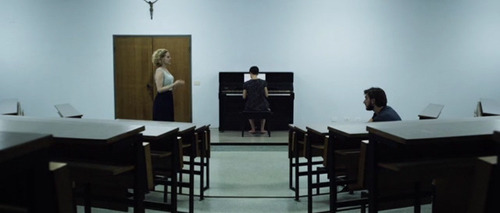
Oh, the shot is too wide and you can’t see his face properly? Well, tough poop:
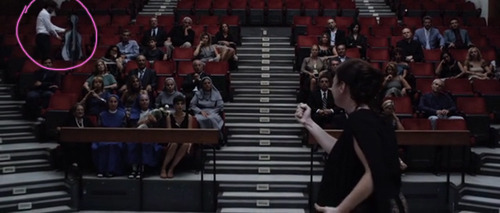
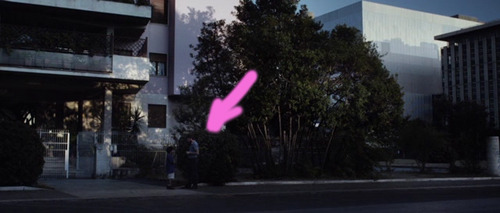
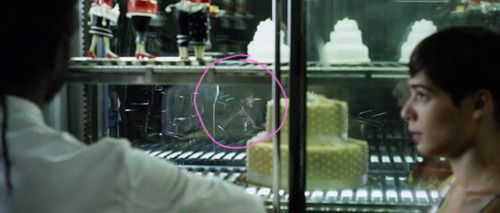
Are you kidding me with this shit?
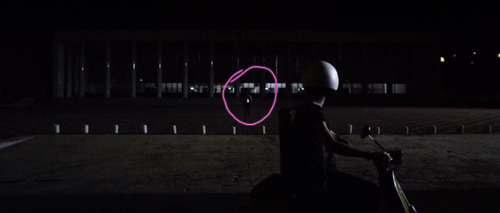
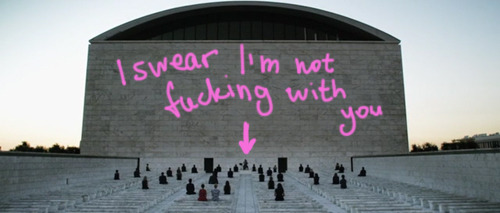
Nina may not be objectively the most terrible of the movies Luca’s been in: I’d argue both Mary of Nazareth and L’ultimo terrestre are worse, as is Slam, whose time’s a-coming. Nor is it the movie where Luca appears the least (The Great Beauty’s literal one minute of screen time is saying hi). But it’s the only movie I have no reasons to watch: it’s blandly shot, poorly structured, badly themed — and it’s actively obstructing Luca’s beauty and charisma. So no matter which film you’ll ask me to do next, at least in terms of the visual component of my posts, we have nowhere to go but up.
59 notes
·
View notes
Text
The Postman (1997)
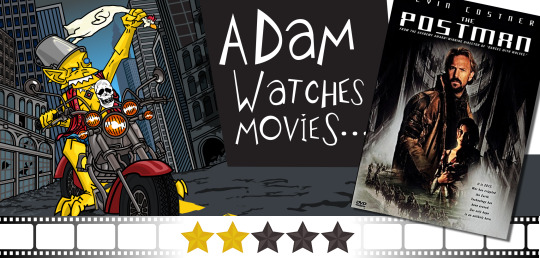
The Postman offers an interesting premise. You can picture an alternate future in which it was a success but we're living in the grim universe, so we've got to make do with what this really is: a film that would've been better if it had been worse. What a shame that it doesn't reveal itself as terrible from the get-go. Then you wouldn’t feel compelled to take anything seriously and you’d laugh it right off the screen.
In a post-apocalyptic 2013 (?!) a drifter (Kevin Costner) comes across old letters and the uniform of a deceased United States Postal Service mail carrier. Pretending that the government has been restored so he can get a quick meal and shelter for the night, he unwittingly inspires hope in a future where a raving gang of military-minded fascists sow fear.
I love the concept. Some random joe accidentally changes the world through a simple lie. It’s not about some great leader rallying forces around him to take down the bad guys. Even calling The Postman (as we’ll refer to him, he’s not named in the movie) a hero is a stretch. It’s a revolution born without the progenitor’s intent, a testament to the power of faith, and the rejection of anarchy. You have a flawed protagonist so you never really know how he will react to this sudden respect thrust upon him. Or you would in theory anyway. In practice… not so much.
The first issue is the casting of Kevin Costner as the hero. His performance is fine but look at him. Someone who steals a uniform off of a corpse and accidentally brings hope to desperate people should not radiate manliness as he does. As soon as Costner shows up, the uncertainty disappears like reason after a nuclear war. You automatically know not only that The Postman will inspire a revolution, but that at some point he’ll also be leading an army of rebels against the villainous George Bethlehem (Will Patton). It’s like casting Kristen Bell as a secretary who can’t get a date. You don’t buy it.
And yet, Costner might've worked if the rest of the picture fell in line perfectly. Too bad the villain is so disappointing. He’s a one-dimensional evil thug. How evil? He’s a cruel, racist, sexist, murdering, flag-burning rapist. To make him extra wicked, the picture shows him raging at trivial things and his multiple self-portraits prove he's conceded. Oh, and he loves to fight mano-y-mano. What I’m saying is that we have a hero that’s flawed and reluctant to join the fight. You don’t know if The Postman is going to save the day, until you recognize Bethlehem as the antagonist. He’s so evil his life won't be snuffed out by the time the end credits roll.
At 177 minutes, this movie is interminably long. You're intrigued by the world. You want to see the world change once it starts to believe the U.S. Postal service and (by association) government has returned. Not intrigued enough to sit there for nearly three hours, however. The Postman's “love interest” (Olivia Williams as Abby) could've easily been eliminated but this film wants to have its cake and eat it too. It wants the villain to be really dark by having him be a rapist, but let’s not offend the audience by making it clear that he’s impotent. Let’s make the hero a wandering drifter that wants nothing to do with this world until he falls in love. These cheap shots are accompanied by forced attempts to milk the audience's patriotism in the form of tattered flags burning and numerous needlessly dramatic moments throughout. The best of these (and I mean best as in wow was it unintentionally funny) comes from a slow-motion scene repeated at the very end of the picture, an ending that will make your eyes roll.
If you’re a die-hard Kevin Costner fan, you'll eat him up no matter what he does, and think it's terrific. I know at least one person who will love The Postman despite its post-apocalyptic setting filled with greenery, the abundance of horses (the cover of the DVD tells us technology has gone away, but the movie doesn’t!), and boring characters. That person isn’t you. It’s isn't aw-ful, but The Postman fails consistently and at so many things that anyone interested should just pick up the book instead. (On DVD, April 22, 2016)

#ThePostman#movies#films#movieReviews#FilmReviews#Post-apocalyptic#KevinCostner#EricRoth#BrianHelgeland#WillPatton#LarenzTate#OliviaWilliams#JamesRusso#TomPetty#1997movies#1997films
2 notes
·
View notes
Text
November 3, 2020 in Pawnee, Indiana
“Why can’t I be mayor?” Sonia yelled in a huff, turning her crying into a tantrum in the line at the Pawnee High School gym. It was a question Sonia had been asking for weeks, one Leslie and Ben had assumed was a joke, not a new found obsession. Sonia wanted to be mayor as badly as she wanted unicorns to be real. It made Stephen’s birthday wish for a motorcycle seem less crazy.
A few voters turned around to look at her and her father, who was glad he was unrecognizable under his face mask. The line moved forward and Ben knelt down next to Sonia, ushering the woman behind him to go ahead.
“Soso, we talked about this, you can’t run for office until you’re 30,” Ben said, patting a reassuring hand on her blonde head. If Leslie hadn’t voted earlier with the boys in tow, Ben might have said how much Sonia’s angry face looked like Leslie’s angry face.
“Actually, you can run for local offices before 30, some offices you only have to be 18,” explained one of the poll volunteers. Ben shot the man a dirty look and he stepped away.
“I’ll be 18 in 12 years from tomorrow,” Sonia said, sitting up and wiping away some of her angry tears. Ben felt a rush of emotions, about how he and Leslie had three almost six year old children, his voting for his own re election, the hope they would oust that fascist orange bastard, and the idea that one of their kids might run for office one day herself. An 18 year old candidate. Just like him. Sonia stood up and the two followed the line towards the voting booths.
“If you run for office one day, your mom and I will vote for you,” Ben said, hoping it would just be something Sonia would forget about by the time the triplets turned 18.
“And Stephen and Westley will too,” Sonia said, knowing the age when people could vote. Earlier when Leslie had voted she had to stop the boys from their habit of Stephen sitting on Westley’s shoulders to try to pretend to be an adult man.
“Our kids are so weird,” Leslie said later, as she and Ben watched election coverage and the kids watched Star Wars. Ben looked back and forth from the news to see how the kids were reacting to the prequels.
“Do you think Sonia would actually run for office when she’s older?” Ben wondered.
“I think that’s as likely as Westley reading a million books and Stephen eating the world’s biggest cookie cake by himself,” Leslie said, mentioning the other goals set by their kids. “Although they are our kids. My drive and my ambition and my hair and your hair. They could be unstoppable.”
“She doesn’t like winter sports, she doesn’t like winter sports,” Ben reminded himself.
8 notes
·
View notes
Text
ENDGAME
Okay. I definitely won’t be able to sleep today, so I might as well pour out all my Endgame feelings right now.
First thing first, I was probably in the WORST POSSIBLE HEADSPACE to watch this film; national elections where fascists could take over Congress (spoiler alert, they didn’t. I literally just cried with relief for over ten minutes) AND being extremely concerned about characters you over-identify with on the same day, all after the worst year of your life, apparently don’t mix well. Who would have thunk.
(btw, I was spoiled as I was voting about That Very Big Thing; everyone who follows me probably can guess what I’m talking about. I almost threw hands tbh. Then almost cried over a dozen times on the way to the theatre because the stress of the day was killing me ugh).
All this to say, my head is a mess right now, I don’t even know if this post is going to make any sense, and I will probably take time to process certain things and have a definite opinion on them LOL. But well, here is now.
And err. Warning for a brief mention of suicide ideation?
(crossposted to dreamwidth, livejournal, and pillowfort)
TONY (& CO)
– In case it wasn’t obvious, the thing I was spoiled about? Yeah, it was Tony’s death. FML. I mean, even if I wasn’t spoiled, I would’ve seen it coming as soon as we saw him after the five years jump, lbr (happily off-screen married to Pepper? With an adorable daughter? Pepper resigned to the possibility of losing him instead of begging him to stay like in IW? And then the movie kept hammering it home LMAO; that and a lot of things for the mains that I kind of saw coming from less than a third into the movie, which IDK if it’s because I was particularly intuitive, or the foreshadowing was that heavy handed xD).
Obviously, I’m not rocking your world if I tell you I’m extremely heartbroken, I guess. Especially because, as I said, my emotions were already all over the place. And seeing a character I adore, and in who I project a lot of my issues on –including, yes, suicidal issues–, sacrifice their lives (no matter how poignant, and moving, and well-written it might be) was incredibly hard for me. So, yeah. I’m going to have to deal with that for a while I guess. Which I plan to do by writing a bunch of Fix-It and Not Actually Fix-It fics ASAP.
But. I mean, out of all the endings Tony could have, this was always my second choice for him. And he was grandiose in this film. He figured out time travel. He created a gauntlet capable of holding the Infinity stones. Beings far more powerful than him were trying to carry that gauntlet to the van and none of them thought to use it, but he did. He was completely vindicated. He is the Saviour of the Universe.
And he looked gorgeous the entire time, which is truly important for me.
– In all seriousness, the thing I take to heart the most is that
his legacy remains intact
, and it’s inspiring, and heroic, and poetic, and prosperous. Clearly, without him, my enthusiasm for the universe will never be the same, but one thing that worried me is that I wouldn’t want anything to do with Marvel for a while after this film, and that’s not how I’m feeling; I’m very much looking forward to further parallels and homages to him in my ever-growing list :P
Tho, honestly, I’m kind of side-eyeing myself for the fact that, the one time!!! I go and fall in love with a male lead character, he happens to be genuinely heroic and self-sacrificing, instead of just using those concepts as lip-service and getting to have his cake and eat it too LMAO. I mean, sure, given my reactions to those characters, the AeJons Snowrgaryens of the world, I wouldn’t have liked him so much if it was the case, but dammit. It’d be nice to experience that high sometime xD
– The Iron Fam is the best part of this movie for me. Tony’s relationship with Morgan was way too adorable to handle it; Pepper was enormous and so poised (and the scene where they circle around each other in their armors… poetic cinema); I didn’t get enough Iron Husbands to satiate me (Rhodey’s caress should have been skin to skin!), but I loved what we got; Happy is an assholes who made me cry ABOUT CHEESEBURGERS.
And let’s not talk about Peter, OMG. My heart. And Harley appeared to Tony’s funeral! Though, honestly, the person I missed the most there was Christine Everhart, who should have been there just on the basis that I like her (plus, ya know, IMO she was important to Tony’s origin dammit).
I’m going to consider Nebula an honorary member, tbh. Her scenes with Tony in space cut me deep; and she and Rhodey are buddies!
Natasha and Fury (I loved his appearance *sniffs*) are honorary members too, because fuck it. They both appeared first vis a vis Tony on his movies, and have two of my favourite relationships with him, and I say so.
– Related to that, one Failure™ of this movie, is not providing a Nat & Tony one-on-one scene. Seriously, I can’t believe they didn’t realize how necessary that was. But I ADORED the scene where they and Bruce are lying down bouncing ideas about the stones (it made me softly whisper “ot3” LOL); it was possibly the only “Avengers” moment that worked for me –other than Clintasha, but that’s on a different league tbh.
I wanted more Nebula & Tony scenes too; I would’ve loved to see Tony interact with Past!Nebula. Yes, realistically, he would probably had made her LOL, but. I needed it. it’s definitely on my to-write-list :P
– I wanted just some positive interaction between Carol & Tony to counteract Current Comics Bullshit and I got Carol rescuing him, smiling beatifically at him, and Tony basically saying she was Da Bomb and the Avengers should follow her lead instead of keep sucking xDD So that was nice.
– I loved the scene at the beginning where he fucking SNAPS, and goes for Steve’s throat. It was probably my favourite scene. It’s resolution with everyone’s reactions and after the flashforward kind of… totally sucked, but whatever. Still amazing.
– The only part of his storyline that I HATED, and I mean absolutely loathed, was his scene with Howard. Jesus Fucking Christ. They went with the most simplistic take they could have, didn’t they. I haven’t felt more insulted in the theatre in my entire life, and my family made me watch both Ocho apellidos movies with them, so Marvel? That’s a feat. The moment where he says his father hit him with a belt so we (Tony included) are supposed to think, well, at least Howard wasn’t physically violent with his son, hooray?
And I think we’re supposed to take his “wouldn’t want my son to turn like me” as motivation for Tony’s actions and like… newsflash, but Tony has “put the worlds’ needs over his own gain” since Iron Man. Fucking. One. It’s literally what he does in this film, because we’re shown that, despite having achieved his happy ending, he was still trying to figure out time travel even if it meant risking his future.
Seriously, if they wanted me to be moved, they should’ve used Maria. Or hell, Edwin Jarvis was right there. And if whitewashing of Howard’s abuse becomes one of those MCU things that ends up bleeding into the comics, I’m gonna riot. Ugh.
BTW, just thought about this. Has anyone confirmed what the H. of Morgan’s second name stands for? Because my immediate idea was that it was for Happy, but now the fear that it might relate to Howard has entered my brain and I need someone to drive it out.
OTHER FAVES :P
– I am a lot more heartbroken over Natasha’s death than I expected to be. I like her character on paper a lot, but sometimes the writing or the acting don’t agree with me; neither was the case in this movie. I thought she was incredible. I loved the scene where she’s leading the post-dusting council. So losing her in this movie, of all movies, really hurts. And I understand why people who love her would be unhappy, and even furious –to some extent, so am I, tbh; specially because I don’t think she was properly honoured by the other characters after the fact–, but I do think it was extremely fitting for her arc.
– I loved Nebula’s storyline; how she was able to form new relationships, and what I know will be enduring friendships. Her interactions with her younger self were fascinating too; I loved that she perfectly followed the time-travel mumbo-jumbo. And she was so adorable at the beginning. Her bond with Tony didn’t have as much screen time as I wish it had, but the rest of the movie really shows how much his kindness touched her, and I love it. I’m a bit sad she didn’t get to kill any Thanos, tho.
– Okay, putting him in the “faves” section doesn’t exactly feel right, but whatever: I maintain that Thanos is a great villain. I don’t know what people that say otherwise are thinking. He’s the perfect foil for so many characters, and he is genuinely villainous; he is so delusional and self-righteous (seriously, his “solution” for the Snap 2.0 was… o.0) his plans feel sincerely menacing. He perfectly spells out his own doom; narratively speaking? He’s a joy of a villain to me. And I loved how he reacted to the information about the future; specifically, that upon learning about Nebula’s “betrayal”, his tactic was SOFTENING towards past!Nebula to make her even more eager to please him.
– Carol didn’t have much screen time, but I liked what she got (like, nothing too deep, but I didn’t expect much). I liked the Carol/Rhodey nod, even if I’m not sure how I feel about the ship in this incarnation. I wanted to hear something about Maria, but welp.
And on a shallow note, I kind of love that fandom absolutely freaked out about her wearing lipstick on a scene (while praising the “~natural no-make-up make up, effortlessly feminine without looking like you’re actually trying” look that she sported on CM, and disregarding that while yes, it was a troubling look that fitted a pattern across movies, A4 was made first so it was hardly a “betrayal” of the semi-grunge style), for the movie to go and give her the butchest look she’s ever gonna get on film lmao (and I will be pleasantly surprised if they’d keep a look like this for a movie where she’s the lead and not a supporting character, tbh).
– Sam and Bucky were So Soft™ with each other OMG. If their show doesn’t have at least ONE episode centred on them going undercover as a married couple, I’ll write it myself, because they are perfect for it (especially if you add some of the early banter/antagonism).
Btw, Sam getting the shield? The only good part of that mess at the end LMAO.
– I have mixed feelings for the Alt!Gamora development. I just… really loved the GOTG-IW versions of her character and her ship, and she’s gone and just… :( And that type of pseudo-amnesia/relationship do-over thing can be so badly written sometimes… But she’s back, and if done right, the role-reversal between her and Nebula could be gr10 for GOTG 3. We’ll see.
THE BAD™
– I know if I walked up right now to the Russos, and asked them why they hate Thor so much, they wouldn’t even understand the question. They would say, but we love Thor?? He’s such a fun character?? Or some version of the sort. They can fool themselves, but not me. You don’t do this to a character for whom you feel a modicum of respect, IMO.
Like, the fat-phobic jokes? The way they dealt with his substance abuse? How his arc about stepping up and assuming responsibilities ended by… him throwing away his responsibilities. Losing his hammer was a turning point for him to relearn the lessons about value and worthiness and power he’d been taught, and then… this movie. I couldn’t even fully enjoy his scenes with Frigga because I was so appalled by it all.
His only great scene, IMO, was how horrified and out of it he sounded after killing Thanos. I really felt that.
I didn’t even enjoy that he passed his power to Valkyrie because… unlike with Sam, that basically came out of nowhere. If they at least had given them ONE more scene at the beginning; seriously, it writes itself: just put her in the room when Bruce and Rocket are trying to convince him to go with them, and have her being the one that does it. Make her help him the way HE helped HER in Ragnarok; show her trying to help him and getting angry and frustrated. IDK, something.
And I know I’m probably alone in this because everyone around me practically creamed their pants when it happened but… having Steve control Mjolnir felt like adding insult to injury. Not just lifting it (which I would’ve been annoyed by too, given that they rewrote the new Asgardian mythology just to have this scene lol), but commanding it as only Thor did. Just. How much more are you going to take from Thor, people.
I want to make it clear that my problem is with the execution, not with Thor going through this; that, written differently, with more care, I could have loved.
– I’ve always been conflicted with MCU Steve. I loved the Captain America old comics I read as a child, and 616 Steve was A Hero. So I wanted to love MCU Steve just as much but… it often felt that he just didn’t measure up.
Well, conflict over. I don’t like the guy. Reading Man Out of Time just a few months ago probably isn’t helping (and yeah, that’s not a fair comparison, but it illustrates why I look at 616 Steve, and I adore him, and then I turn to MCU Steve and just… this guy is not worth my time).
I couldn’t even enjoy the ship, because my feelings for it come solely from my love for Peggy, and she didn’t even get to say a word? Add to that the fact that an endless loop of “OMG HE MADE OUT WITH YOUR NIECE. NOW HIS NIECE. RUN” was going through my head the entire time (the fact that Sharon was absent from the funeral when EVC acted in half of the MCU Russos films is hilarious in light of this xDD).
MISC
– I really enjoyed some of the heist shenanigans. Especially Tony’s plan for a distraction being GIVING HIS PAST SELF A HEART ATTACK. How extra and edgy can my man be xD Tony and Scott are A Duo.
– I was thinking that Alt!Loki might make an appearance in GOTG3 if Thor is really a part of it, and how that might mix, but then a friend reminded me about his show, so I guess that’s where they’re going? IDK, The Avengers’ Loki is probably the one I liked the least out of all his appearances, so unless I hear something really good about it, I’m not picking it up.
– IDK if it’s because I was desensitized, but the white suits and Clint’s hairdo didn’t look as ugly on the final product?
– So THAT was the gay character Feige went on about. I knew he was going to be an unnamed nobody with less than five lines LMAO. Stop being cowards and give us Danbeau and WinterFalcon.
– I was very touched about Ned and Peter’s hug (MY BBYS), but isn’t Ned supposed to be five years older? AKA out of high school? I mean, he looked like he had missed Peter, not like he had disappeared with him too? And the entire class is going on a trip in FFH? Is it because of nostalgia/a friends thing? Were all of them dusted? Because poor teacher then xDD
– I think a lot of emotional threads were unceremoniously dropped, but other than the ones I’ve mentioned, I’m more indifferent towards their recipients so… eh. A great example is the fact that Bruce’s conflicting journey with Hulk was solved off-screen LMAO. Some of the humour felt extra-cringy too tbh.
– I have Tony-related fanart as my lock screen, my computer background, and my phone background. I get teary eyed with just looking at them. I should think of changing them, but I wont xD
– I know I’m forgetting things but whatevs, I can talk about them later.
#tony stark#mcu#marvel#iron family#thor odinson#nebula#natasha romanoff#thanos#winterfalcon#and other stuff but i'd be here all day#marvel (movies)#gamora#avengers (movies)#avengers: endgame#endgame spoilers#my thoughts#talking to the void#marvel thoughts
10 notes
·
View notes
Text
The Young Ones Lolipops and Gumdrops Chapter 4: Years on into the vaporwave moonlight
The Young Ones in the 2010s
note:this chapter is littered with Internet references.
Rick was on a parade float holding a guitar filled with "angst"
he had a military type outfit on and his pigtails were undone so his semi-long hair could be shown
"When I was a young child, my dad took me into the city, to see the marching band,"
"he said, Richard, you'll grow up would you be the poet saviour for the people, broken, beaten and the damned
Neil would play post-grunge songs with local bands for events like weddings, pub parties etc. , Mike was in a rockabilly revival subculture and Vyvyan was a fan of White Stripes and Gorillaz
But a new decade was just starting to show
Rick said,
"Vyvyan that's the wrong tape rewind it"'
Neil moaned as he worried about the camera
"Oh guys stop being so heavy it's just a polaroid"
Vyvyan then adjusted the camera correctly and handed it back to Neil who was wearing hipster attire with a star necklace around his neck and tarot cards in his other hand
.......SHUTTER...........rec:o beep 02:10:18
Rick rested on his bed posing in an "aesthetic" way decorated in an 80s anime styled sweater with his name written in Japanese characters, a pastel coloured cardigan and his plaits out like before
wearing light orange shades singing the song lyric "I want blood, guts and chocolate cake"
Vyvyan ran over to his side placing a tray of crisps, ketchup and chocolate on the dressing table
dipping the crisps in the ketchup eating them as he begun to fidget with a fake rainbow coloured butterfly knife before shoving Rick's face into the chocolate cake
"VYVYAN YOU RUINED MY AESTHETIC!"
Vyvyan screamed
"I WAS BORED, IT'S NOT THAT HORRENDOUS TO OFFEND OSCAR WILDE IS IT"?
on a book cover, a ghost of Oscar Wilde is folding his hands sarcastically "no I suppose not peasant"
later that night Vyvyan was sitting in front of his laptop recording with a torch, microphone and horror figurines around his room
"Hey mates it's Vyvyan's spooky storytime of True Crime" "so there was this girl in Liverpool and she knew some boys of the neighbourhood who would frequently mock and harass her so...she stabbed them and hid their corpses in the local pond"
"BE QUIET IM TRYING TO LISTEN TO JAPANESE 80S MUSIC WOULD YOU STOP BEING A HYBRISTOPHILLIAC!" Rick shouted from next door
Vyvyan shouted back, "CULTURAL APPROPRIATOR"
Rick overdramatically gasped "How dare you I am no weeaboo unlike you"
the next day they were at Mcdonalds when Neil noticed something about their meal
" I don't think we should eat this, it's not vegan you don't get it I'm literally eating death"
Vyvyan shrugged
"It's no different than the rest of the manufactured garbage you get in these places"
Mike nodded and Rick smirked,
"Yeah Neil, if you hate the place so much eat somewhere else"
Neil moaned "but I don't go anywhere else without you"
they all groaned while Neil kept complaining
"You see all your doing is killing and torturing these animals"
Vyvyan rolled his eyes "Yeah animals that eat their offspring"
Neil wouldn't shut up so Rick stabbed him with a fork
when he noticed Mike was telling a waiter about what happened he hid in the bathroom
"I can't believe it I killed Neil, it was all over one silly argument how could I?"
Vyvyan opened the door "you, miserable sod you can come back out now Neil's still alive nothing serious"
Rick breathed a sigh of relief "Thank goodness"
a few days later Mike wanted Vyvyan to stick his head out the window again.....for the vine
"ok Vyv just do what you did before on university challenge," Mike said as he manoeuvred his phone
"Do not stick your head out the window, mmm I wonder why" Vyvyan then slammed his head against the window as the video was done being recorded
Mike smirked to himself "this will get me lots of hits" Vyvyan had a few cuts on his face, he wasn't happy "You bastard my face is gonna need stitches now because of this!"
Mike ignored him only for Vyvyan to say "It's not stopping me from wanting to kick your face in" as he chased Mike and had a slapstick fight with him
while they were in the middle of that Billy Balowski was nearby rapping badly "Hey it's Lil Balowski and this is what I'm doing today I'm kneeing this two for not giving their pay"
It was night-time and Vyvyan and Rick were watching the sunset
Rick said, feeling nostalgic "remember the good old days when we would attack each other with cricket bats and call out thatcher in our satirical performances"
Vyvyan finished his cigarette and said "Yeah, those were wild times of complete madness the chasing like tom and jerry and constant mentions of bottom"
Rick laughed it off "I recall you wanted to kiss my bottom" Vyvyan smirked "I did not, you wanted to kiss my bottom, anyways we were young ones then and we aren't young anymore"
Rick looked out into the now present moonlight "technically we will always be young ones, the floating timeline keeps us this way, it's like hell but it's our personal hell an anarchic fun open hell, not a fascist one"
Vyvyan nodded "hey, what was your life before this like anyway?" Rick inhaled and said "Well it certainly wasn't all lollipops and gumdrops" "I had some elements of self-expression and I did love some parts of my life but other parts are overshadowed by trauma, loneliness, being told to believe on the right wing side of things. Where nothing but political lies were fed to you with Teresa and Trump the world seems to be repeating itself, but I never got a chance to fully spread my wings until meeting you. I was usually a quite timid, shy bloke, heh I do like the others but it was you who I felt the most connected to...you had an energy that I wanted but now I know I already had it now I have someone beautiful to share it with."
Vyvyan was surprised that all of that was hidden in those whining tantrums Rick had back in the 1980s but he felt like his eyes had been opened he felt the same way, he held Rick's hand and smiled at him
"I think so too, you, annoyingly revolting, amazing sod"
Rick blushed under his glasses
Vyvyan mumbled, "P-Peoples Poet"
Rick then kissed Vyvyan
he kissed back as they cuddled throughout the night
no cricket bats, no punches, no fighting
just love sickeningly revolting but wonderful...love
......Love is the answer ~ Rik Mayall (1958-2014)
#the young ones#tyo#young ones#rivyvyan#modern au#references#fanfic#rick pratt#vyvyan basterd#neil pye#mike the cool person#mr balowski
1 note
·
View note
Photo

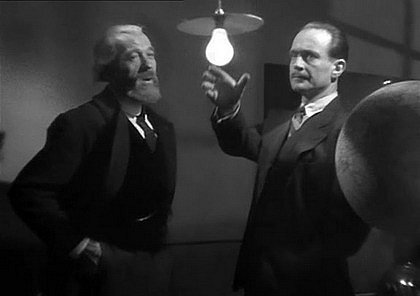
[59] Le Corbeau / The Raven (1943, dir. Henri-Georges Clouzot)
Clouzot’s second film takes up thematics later explored in ‘La Verite’: more communities on trial, more moral hypocrisy. But, if that film was overshadowed by the real-life media circus surrounding Bardot, whose hypocritical hounding it uncannily mirrored, so too this film has been overshadowed by historical circumstance--albeit with higher stakes. Produced in Vichy France by ‘Continental Films’--a German-backed French film company which formed part of the effort to Germanize cinema along Nazi lines, yet within this frame also enabled its filmmakers’ relative autonomy and freedom from censorship, rather than requiring Fascist propaganda--the film has a contested legacy as either furthering--intentionally or not--a Vichy or an anti-Vichy line. According to these views, the film--falsely reported to have been shown in Germany under the title ‘A Small Town in France’--pushes a Vichy and Nazi besmirching of French national character as venal corruption, thus implicitly requiring the iron discipline of Aryan occupation; on the other hand, it serve as anti-Vichy satire depicting the rot within petty-bourgeois provincial towns by which townsfolk turn on each other, anonymous denunciations placing the airing of simmering suppressed resentments, jealousy, vindictiveness, competition and opportunities for personal gain at the expense of a collective resistance to occupation. Add to that the less than respectful treatment of the Church, the non-judgmental presentation of abortion, the casual attitude to sexual fidelity and non-marital sexual activity, not to mention suicide, murder and the rest, and the film also fell foul of the Catholic moral conservatism and patriotism that might flow into either pro- or anti-Vichy sentiment. Both the pro- and anti-Vichy interpretations suggest an allegorical structure to which the narrative structure easily lends itself: that’s to say, the effects of a structure-challenging catastrophe from outside or within (think Camus’ ‘La Peste’) as diagnostic for what already lay beneath the surface of just another town, ‘ici ou ailleurs’, as the title credits put it. Two images. 1) The community, turned near-feral by the spate of poison pen letters, have got it into their head that the nurse Marie Corbin—already disliked for her status as single woman and for her lack of ‘feminine’ compassion—is the letters’ author and thus responsible for the suicide of the hospital patient for whose funeral the whole town has turned out. Fleeing to her room, she finds her belongings trashed, her mirror smashed, the words ‘in prison’ daubed on her wall; fleeing again, she’s taken away and locked up. Just as the letters themselves, the angry mob break the thin dividing line between privacy, individual secrecy—the unspoken assumption that one can be left alone with one’s desires, for whatever or whomever they may be (perhaps simply ‘peace and quiet’, as one character says)—and public knowledge, a transgression that hear leads to violence and condemnation in the name of a collective good that’s nowhere in real evidence. 2) Drs. Vorzet and Germain dialogue beneath a naked lightbulb which, set a-swinging within a schoolhouse (location of moral training, of the passing on of methods of knowledge and power) refuses to cast its light on any one area, to fix a target in object lesson, in a point of origin for ‘evil’, for actions which expose and destroy the false tranquillity of social relations, hierarchies, institutions. Vorzet—psychologist, claiming the essential moral ambiguity of the drives, condemning the tendency to moralistic judgment, apparently compassionate; Germain, the M.D., with the morality of the uptight bourgeois, emotionally closed-off yet motivated by trauma. The final Revelation: Vorzet himself is author of the letters. Murdered by one of his victims, his blood flows onto the desk where he’s writing yet another poison-pen, in a kind of destructive cycle which reveals both everything and nothing. Germain, his moral clarity shattered, opines that perhaps ‘evil is necessary’, exposing and bringing together the community—purgative? cathartic? a humanist faith a la ‘La Peste’? That would be to read too much between the lines: the film refuses moral/istic outrage through a mask of cynicism that nonetheless doesn’t preclude moral judgment. If this suggests both having one’s cake and eating it, it’s easy to see how such inscrutability might lend itself to the position of the filmmaker within the complexities of wartime occupation. In that sense, the historical circumstances that produced the film are precisely those which render it strangely illegible nearly a century on.
1 note
·
View note
Link
This is the most depressing “defense” of a liberal by a liberal in I don’t know how long.
Police unions lead the conservative pillory project against anyone standing for oversight on police and respect for suspects’ rights because it’s not in their interests that the police have oversight or that suspects have rights respected...does it magically become slightly more in their interests when a white man says it, than when a Black/South Asian woman does? I can’t fathom how...
The essential message here is that it’s so very hard to be a Black-identified female that it’s sorta ok for anyone who is, no matter how otherwise privileged, to be an ambitious political opportunist who cares more about getting re-elected than about the values they claim to stand for. For a politician to be so is certainly nothing new, but the idea that people should not criticize politicians much for it if they happen to be the wrong colour or gender because “it’s a problem with the system and its racism” is quite new and dangerous, not least because we are essentially caring more about how “unfair” life is to an educated wealthy person because they might not get re-elected, or might get their feelings hurt, than about the people down at the fucking bottom of the dog pile who might get executed or spend decades in prisons for crimes they didn’t commit. “She did what she had to” sounds an awful lot like, “I only did what I was ordered to do”. Except, of course, she didn’t have to do anything. Nobody had a gun to her head, she chose to do it to fulfil her own vaulting ambitions.
And I’m sorry but all that, “but then she wouldn’t be in a position to do so much good as VP in a few months!” is so much bizarre quasi-fascist garbage like Saruman trying to tempt Gandalf into joining with Mordor on the grounds that at some hypothetical point in the future they might “come to direct it’s courses”. Sorry, I’m not “Woke” or morally compromised, I’m Jewish. I may suck at it, but I’m still good enough at it to not hold with the idea of permitting evil now for the sake of some hypothetical good in the future. A good which is by no means certain. First Biden has to win, after all (which is possible)...then Kamala Harris (along with Biden) has to decide doing right is more important than getting a second term, and then there’s the prospect of becoming “the first African-American female president” which two terms as VP might set you up to be tempted by (so I am not holding my breath but who knows, maybe she’ll do a little of that hypothetical good in her final term as POTUS, 12-16 years from now.)
If we’re going to be hypothetical about things, what if Kamala Harris had never made it so far as an election and instead some other candidate with actual moral backbone had been run and now THAT exemplary candidate was just chosen for VP? Would it be just awful if that exemplary candidate happened to be a man and a WASP? Or perhaps she herself, having stood her ground and earned some grudging respect, might have won later on? Or some other worthy minority candidate?
But, as C.S. Lewis put it, “nobody is ever told what might have been”. You ultimately can’t run life based on hypothetical things that might have been or on hypothetical goods that might appear. You make the best choice you can based on the existing evidence and the likely trajectory it shows. A lifetime of opportunism and ambition does not suggest much to me by way of upward moral mobility so I’m gruntled not to be facing this choice as a voter, which resembles the choice I gave to a preschooler who doesn’t like art smocks this morning...do you want the green smock, or the red smock? (Because you’re wearing a smock or you don’t get to paint.)
This is part of the longstanding trope that “the problem is really racism” and all the wars, profiteering and predatory capitalism would stop if only we had more diversity at the top, because self-evidently BIPOC and female people educated and wealthy enough to run for public office would vote totally differently on the issues than educated and wealthy whites and men.
Do they though? I’m still waiting for it to happen.
And wasn’t that the god-damn point of all the diversity we were trying to get into government, that it was going to smash the patriarchy and white-supremacy and the good old boys’ mutual back-scratching club? And here’s Beinart come along to tell us that it’s actually working the exact opposite way and that all our diverse candidates are way too shit-scared of not getting elected to have more morals than the old white men they’re replacing. This is like Wile E. Coyote sent away for the ACME Social Justice Kit and it’s now blowing up in his face.
What was it, “They can’t afford to have Bernie Sanders’ moral purity”? Why, because it’s such a cake walk being a Jewish socialist starting your political career during the Evangelical “Moral Majority” and Reagan cold-war years? And then running as an Independent in what has long been considered an unbreakable two-party system? Not even Bernie Sanders can afford Bernie Sanders’ moral purity...which is why the Dems didn’t run him against Trump when they should have...yet he still has it, and seems to mysteriously prefer sleeping well at night to whoring himself out for a few shekels and an office where ordering new carpets requires calculations involving Pi.
And the loss of that election was basically guaranteed by the fact that the Dems were all pissing about with identity politics trying to get a *vagina into the presidency even if it lost them the election. Which it did, so thus pissed away all the hypothetical good having a female president might have done, which was only ever going to be symbolic anyway. Clearly they have learned absolutely bobkes from that. *And yes, when the only thing you really care about is the genitalia of the person you’re trying to get into office, you’re no longer running a woman (a person who happens to have a vagina) you’re running a vagina.
This all reminds me of my annoyingly sanctimonious sister. She natters on and on about how many tenured professors are BIPOC and then looks at me aghast when I say I don’t actually give a shit how many educated and wealthy BIPOC people get bit more wealthy and secure. I care more about how many people can’t eat and pay their rent, or can’t afford their utility bills and are getting their power and water shut off. I care about people worse off than I am, not better off. The toejam in the toe-cleavage peeping out of Kamala Harris’ pumps is more privileged than I will ever be, (and I’m not so badly off at the moment) and more privileged than 99% of the U.S. populace, so the idea that she needs a horde of people rushing to her defense is patently absurd. If she didn’t get chosen for VP what...she’d be so oppressed she’ll be living out of a rusted hatchback by next week???
This entire drama of the Biden running mate has basically been “which woman of colour should Biden choose to best capture the vote” as opposed to “which of the available candidates is the best possible choice to achieve our progressive goals” and that’s a bit horrifyingly Orwellian.I It’s like a sort of trophy-wife...which one will bring me the most prestige and help me “win” at life. And, echoing my earlier comments, there’s something distinctly disturbing about the degree of emphasis on choosing a racialized woman. I’m not sure how electing a vagina with more melanin to office is an improvement over electing vaginas in general. Women have been complaining for decades about the tendency of some men to view them as disembodied sexual parts. How did it become something progressive women now cheer about? Whereas if he’d said, “All other things being equal, I intend to chose a running mate that will best embody the Democrats’ commitment to diversity and better proportional representation.”, I would not be feeling like women and minorities were just being added to the ticket to make up numbers, like goods in a packing crate; we need 6 of this, and 4 of that...
If the Dems win are people next going to be discussing which Latinx he needs to appoint to the Senate, and which Indigenous person to the Judiciary and which trans doctor will replace Fauci when he retires? You’re laughing now, but let this sit on the floor awhile and see if the cat licks it up. I was right about the moral trajectory of Israel 15 years ago, something Beinart only discovered this summer, and I feel good about my odds on this prediction. Left unsupervised, these “woke” ideologies will do what all ideologies do, and reach peak stupidity, which will, of course, result in a a wild and reactive attempt to correct for them by rejecting everything about them. The only thing stopping that is for people to look at them critically now and correct for extremism and ideological blind spots before an iconoclastic paraxysm. I’m not societies great hope here...I’m just a woman with a tumblr adding my two cents to the critical mass needed to do that.
I happen to heartily endorse more types of people getting into government who currently are kept out, just not at the cost of *good government itself, and not based on the laughable premise that a room full of people all from the same tax brackets, who all went to the same schools, is “diverse”. Honest to God, America should just stop having elections at this point and start mailing out notices to randomly selected citizens. Then they might get actual diversity, as opposed to La Senza diversity, where there’s only one actual bra but hey, it comes in 37 different colours so, hooray for choice.
*whether anything in American (or any) politics resembles actual good government is debatable but we’ve spent the last 4+ years finding out just how much further the GOP can get from the ideal than we’d ever thought it could and Right and Left always mirror each other. To my mind electing and appointing people by identity rather than competence freed from unnecessary stumbling blocks is also a giant leap backward from it.
#politics#things that radicalize me#anti-idpol#anti-woke#democrats#kamala harris#peter beinart#identity politics
0 notes
Text
Won't Wave the Flag!
I'm not sure where push will meet shove, but something has to give. The will of the people has been ignored for far too long in this country. Anarchy is not my go to solution. But we are at the point where it may take the knocking down of the fence or gate to the White House for there to be an awakening. No one has to get hurt, but we could sure use a national awakening. Can we all just please admit that Instead of caging immigrant children for profit this country would be a lot better off if we caged the wicked few like Donald Trump and forced them to eat their own cakes until they died. If that seems too cruel think of all the suffering he has inflicted on innocent people. We could give the Lord of the Lies at least a chance and just hunt him for sport. Here Piggy, Piggy! I'm pretty sure that fat fascist pig can't run very fast, so that reality TV show wouldn't last very long. The date is January 8, 2019 and I stand firmly and strongly in my conviction this country has become a shithole. The masses do not have adequate access to healthcare, education, or economic opportunity in this country anymore. This country doesn't need to be a shithole, but the people must take back and enforce their power. This has happened before during the last Gilded Age. America's wealthy had become too powerful and out of touch then too. They even convinced themselves they were doing the poor a favor by placing gold decorations on the same iron gates and fences that were erected to kept the poor out. I'm pretty sure they thought the poor wouldn't even notice they were still poor if they just got to see gold. The power dynamics need to shift. I don't care if the 1% of this country is richer than ever; I do not speak on their behalf. What we should be acknowledging is the 1% is just actually greedier than ever. We have had decades of failed policy. Ronald Reagan really did love America so much he created two Americas. That's right the America for the 1% that has gotten richer and richer every year and the other America the vast majority now know. The other America is where wages have purchasing power have been in slow decline for decades when you factor in inflation and everyone has been in a slow slide into poverty. This time around it's not the rich letting the poor see gold, they found out that didn't work. It's the rich trying to convince the poor their poverty is their own failing and if they had bought a couple less coffees and avocado toasts they would be billionaires too! Well, I'm here to tell you the math doesn't work out on that. I'd also like to clear up one other thing. There is nothing "Christ-like" about Donald Trump. Anti-Christ like yes. Here's one clear cut example, Jesus would not have exploitatively locked migrants in concentration camps and separated parents from children to help fuel profits for a fascist corporate scam. Jesus would have helped the migrants. I'm not over religious but what one needs to first understand about the concept of the anti-Christ is the definition: one who will oppose Christ and substitute himself in Christ's place. Under that definition Adolph Hitler was an anti-Christ and Donald Trump is also an anti-Christ. What Trump chose to do is something an evil-minded and wicked Russian would do. That can most easily be explained by maybe if one marries enough Russian women one becomes Russian. It can also easily explained by the fact it has become increasingly clear Donald Trump sold his soul to Russian Businessmen a long time ago in exchange for loan guarantees. Several Trumpeters told me I should have to leave the country today. That's textbook fascism: don't address the actual problems, try and silence or remove those that speak the truth. My position is clear, I would not have waved the flag for Hitler and I sure as hell won't wave the flag for Donald Trump. #trumpantichriat #revolution #stoptgefascistcoup
0 notes
Photo

By its cover, “Nightwing: The New Order” looks like a certain kind of book and to a degree it is. But it sets itself up to potentially be more than its contemporaries and covers make it out to be.
The lag time between creation and release in art can be a fickle partner. While endemic to the core themes of the franchise, aspects of the War for the Planet of the Apes(2017) have a wholly different resonance compared to when co-writers Mark Bomback and Matt Reeves wrote the script, and later when Matt Reeves directed it. The same goes for former “Batman Beyond 2.0” duo writer Kyle Higgins and artist Trevor McCarthy and their new Elseworld miniseries “Nightwing: The New Order.” While any miniseries dealing with a popular character, especially one of Romani heritage, fall to fascism would be controversial its placement in a post- “Secret Empire” context gives it a different resonance.
Elseworlds are one of the more interesting aspects of superhero stories, in exploring the multiverse writers are able to create new variables and play off the multiversal constants of characters or challenge those perceived constants all together, creating a spectrum of understanding. Elseworlds let creators show how a small ripple effect can have large consequences (Superman landing in Russia instead of Kansas) or act as points of genre fusion like throwing the Justice League into the Old West. The scary aspect about “New Order” is revealed with McCarthy’s art, it really looks like a future of DCU that never experienced a “Flashpoint.” His inks maybe a bit thicker and colorist Dean White’s blends maybe a bit too smooth but the overall aesthetic is reminiscent of DC comics from 2005-2011. If you took out the first two pages and started on the opening street chase between a badge wielding Dick Grayson and Dr. Light, it’d be hard to imagine something being wholly wrong with the state of things. The Batmen themed police even gesture towards a visual continuity with “Batman Beyond.” While this Dick maybe getting a little gray in the temples, McCarthy’s acrobatic spread that tracks the grace of Grayson against the unathletic Light shows that it is still the Dick readers know. Like many excellent Elseworld stories, so much of Dick’s actions in this book read as mainstream Dick Grayson … there’s just something rotten about this whole situation.
The opening pages to “New Order” reveal the conceit of the series: a decade earlier Dick Grayson set off some kind of Dominator-esque metabomb and took out the vast majority of the world’s superhero community and “saved the world.” Just to be slightly pedantic, “meta” in this series appears to be used euphemistically for “super powers” of all kind because Superman and Wonder Woman are shown being affected by it and they’re an alien and demigoddess respectively. In response the U.S. Goverment has instituted authoritarian policies to police the remaining meta human population and Dick is their willing front man. Yes, “Nightwing: The New Order” is another exercise in dark future, overtly fascistic, superheroisim.
“The Dark Knight Returns” reveled in the Dark Knight’s surgical brutality and ability as a non-state actor to affect and control a chaotic world. “Secret Empire” attempts to have its cake and eat it too with inevitable cosmic cube powered timey whimey macguffery. There’s the dark future hinted at in the recent “Batwoman” #6. In all of these cases the darkness that created their dystopic present is always treated as a natural occurrence. Thankfully Kyle Higgins puts forth a relatively novel twist in the examination of the fascism that stitches together the super heroic figure. Higgins first creats an immediate release valve for the tension and notions developed by the covers, various marketing materials, overall context “The New Order” finds itself in, by powering the story through the retrospective narration of Dick’s son Jake. This narrative choice creates distance and allows the series to be viewed through the thematic lens of fatherhood, parental relationships, and idolatry. Jake’s narration (which gives things a mythic Road Warrior vibe but get a little too cute for its own good after a while) sets this story up not to be a revelatory or even cautionary experience, but a human one.
Read my full thoughts on the issue HERE on @multiversitycomics
#Thoughts#DC comics#dc elseworlds#nightwing#nightwing the new order#kyle higgins#trevor mccarthy#The Dark Knight Returns#secret empire
3 notes
·
View notes
Photo
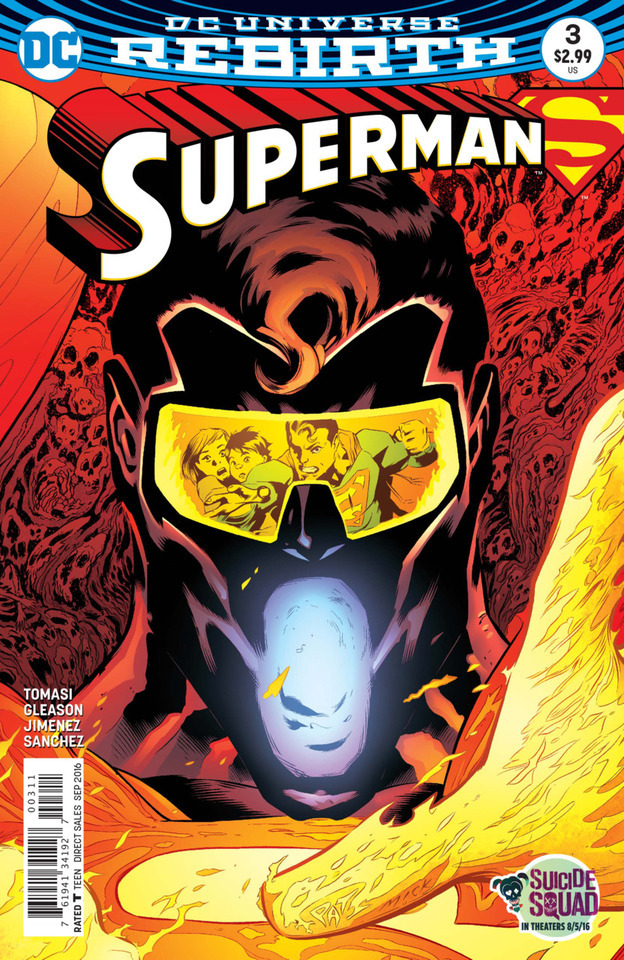
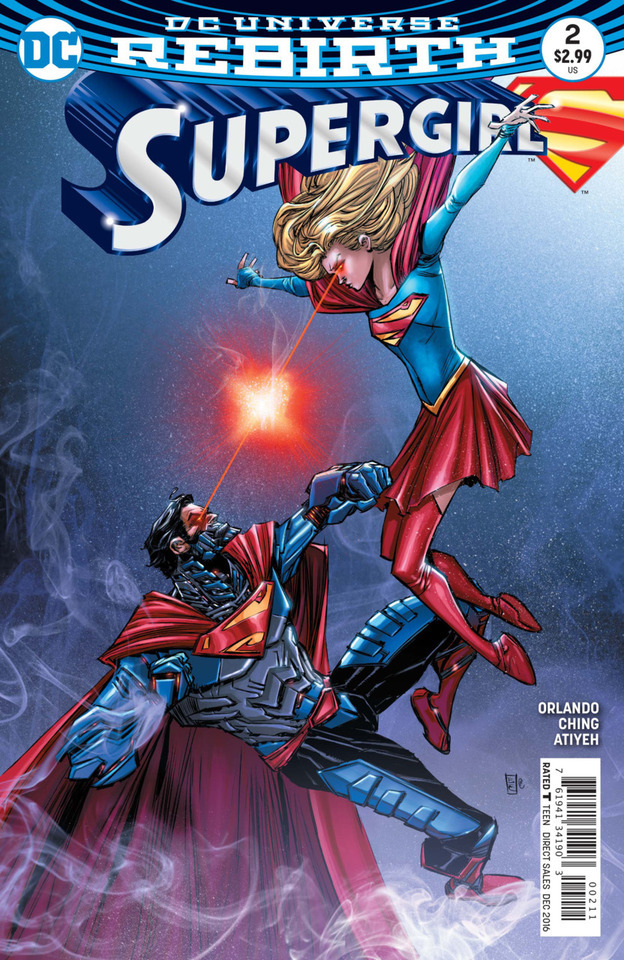
Cleansing the Crimes of Old Krypton: Comparisons Between Superman #1-6 and Supergirl #1-6
Ever since the rise of the comic-book anti-heroes, Superman and his family were positioned by writers in the opposition to them. This is a natural progression for those who understand the character’s roots as the hero of the little folk. Such qualities are resonating with the liberal and socialist ideals. Meanwhile, antiheroes often voice ideas that would be very terrifying if said by real-life politicians. The efficiency being presented as more important than human rights or collateral damage. The idea that the justice system only stops the protagonist from doing what’s necessary. An approach where stopping the bad guys is more important than protecting the innocent. These ideas can easily be applied to politics. And as a result, lead to authoritarian or outright fascist thinking. Don’t get me wrong. Some people claim if Batman won’t kill the Joker, he has the blood of Joker’s future victims on his hands. I’m not saying they’re cheering Donald Trump saying federal judges who overruled his ban on Muslim Immigrants are to blame if a terrorist attack happens. But we need to recognize the parallels.
Many successful antihero stories were built on exploring the consequences of this approach. You can find those themes everywhere from The Authority and V for Vendetta to Code Geass. Sadly, lately, we have a continuous increase of those problems being glossed over. And not only for actual antiheroes but even more upstanding characters. Especially in movies. Once paragons of virtue on big screen become terrifying. And yet we're supposed to cheer when they commit atrocities. Violating borders of a foreign country, intruding on people’s privacy, destroying an entire city in battle, murdering people. It all becomes not only justified but even glorified. They say it’s okay for “good guys” to do those things. Because otherwise, we’re all going to die. Because they’ll stop once the danger is gone, pinky swear. Because only the bad guys get hurt and killed. So relax and handle all the power and no accountability to those guys, they need it to protect you.
Superman stories often tackled this issue. Sometimes results is a compelling, meaningful voice in the discussion. Other times we get an awful, hypocritical story. That is given praise regardless because it sticks it up to the other side. “What’s So Funny About Truth, Justice And American Way” and it’s adaptation “Superman vs the Elite” are a prime example. There Superman proves wrong the Authority knockoffs who claim that might makes right. By beating the living shit out of them, thus proving that might do indeed makes right…. if you’re Superman. Thankfully, two stories I want to talk about do not have this problem.
For inspirations, both stories reach back. To a tale of 4 individuals that tried to replace Superman after his supposed death - Reign of Supermen. Superman books under Rebirth banner, in general, try to recreate the feel of that era. Superman is dead and his replacements start showing up. Kenan Kong in the New Super-Man, Lana Lang in Superwoman, even Lex Luthor dons the cape. But DC managed to have their cake and eat it too. The main Superman book still has it's Man of Steel. It's Superman from another Universe, with wife and son. He is more in line with old DC Continuity, compared to Superman that died. Meanwhile, Supergirl reaches to feel more like beloved TV Series, even if Kara is still a teenager. To connect with Reign of Supermen both books use a different way. They reach for its “bad” Supermen - Eradicator and Cyborg Superman. They also revamp them to have them fit a specific purpose.
Or use earlier revamps, as is the case with Cyborg Superman. Before Flashpoint this name was held by Hank Henshaw, a scientist with a grudge. In New 52 he is the man who had sent Kara to Earth from Argo, last surviving city of Krypton. Her father, Zor-El. He failed to save the whole colony and is desperate to undo past failures. He turns dead corpses of his citizens and even wife into cyborgs like him. But to regain sentience the need to consume life force of intelligent beings. Then Zor-El hears Kara cry in her moment of doubt. She question she’ll even be able to fit on Earth and how strange and, well, alien, our customs are for her. Her father doesn’t hesitate. He decides to invade Earth, harvest humanity to resurrect Argo and take his daughter back.
Eradicator was absent from New 52 era of DC, to resurface in Rebirth, with a simplified origin. Before Flashpoint it was an alien A.I. obsessed over Krypton. In Rebirth Eradicators were created by General Zod. It was a mechanical police force used against both criminals and political rivals. This one came back to life through contact with the blood of Superman’s son, Jonathan. And then vowed to protect and restore Krypton’s legacy. Starting with the last heir of House of El, Superman himself. Clark is reluctant to trust the robot when it offers to examine Jon’s health and fluctuating powers. Turns out it was a good call. Eradicator decides that being half-human half-Kryptonian, Jon is impure. And that the best way to heal him is to eradicate human part of his DNA. Jon would become fully Kryptonian, but also cease to exist as a person he was up to this point.
Both those villains have a history of representing darker shades of Krypton. In old continuity, Eradicator was a go-to explanation for every Krypton-related bad thing. Villainous interpretation of Zor-El is nothing new either. Before Flashpoint his whole motivation was "He hates his brother, Jor-El". He didn't send Kara away to save her, but to make her kill Kal-El. He had brainwashed his own daughter to make her a weapon against her cousin.
If anything, this version of him comes off as, if not sympathetic, then at least pitiable. Flashbacks show us he was a caring, loving father, who sent Kara away to protect her. It makes it much more tragic to see how far he has fallen. Even Kara starts to feel bad for him over the course of the story. She recognizes in him a man haunted by his failures, whose actions are a desperate try to fix everything. But Supergirl still calls him out. She points out that he doesn't care about anything but himself anymore. If he did, he’d see how twisted his “solution” actually is and try to find a better one. The results were more important than how he achieved them. And things like mass murder became merely means to an end. It doesn't matter how many he has to kill. It doesn't matter he turned his wife and friends into mechanical monsters. Once he gets them back, everything will be back to normal, he tells himself. He expects his wife and daughter to go back to their old life and ignore all the blood on his hands. He is delusional. When his wife regains part of her mind, she sacrifices herself to save Kara's adoptive mother. She'd rather be dead than part of this. Does it get to him? No. because for Zor-El it doesn't matter how appalling his methods are. Only that he wins.
Both Zor-El and Eradicator are operating on racist and xenophobic assumptions. They see everyone who is not Kryptonian as inferior and disposable. The whole idea of a Kryptonian living with human family is appalling to them. Zor-El several times states he never meant for Kara to stay on Earth forever. He expects her to simply abandon her new home, now that it served its purpose. He also mentions in passing wars betweenKrypton and other races. It's implied they were as horrible as what he is doing now. Meanwhile, what is Eradicator? A Kryptonian version of police brutality and law-enforcement being used for political reasons. All these factors make the reader ask a question neither of the villains bothered with. Should you bring old Krypton back? If Kryptonians were warmongering xenophobes, then why should they return? Who is to say if they do, they won’t go down the same path again? Neither Eradicator nor Zor-El makes a strong case against this argument. Not when they’re willing to stomp into the ground anyone who stands in their way.
We live in times when people in power tell us we need to give up parts of our freedoms for our own protection. That we need to do whatever it takes, no matter how unethical, to protect our way of life from “the enemy”. Even if it means crushing rights of those different from us. This is no different from many anti-heroes in comics. How often do we see one accusing more restrained superheroes of not having what it takes to “get the job done”? Or claim not only are they too weak, but people they protect are dumb masses easy to sway and control? Those themes are still being explored by creators of both books. Peter Tomasi and Patrick Gleason do it through later Superman villain, the Prophecy. Lord Havok and the Extremists serve this role in Steve Orlando’s JLA. But it isn’t enough to have heroes beat this type of villains. What is even more important is how they beat them. As I mentioned above, in that kind of stories it’s easy to come off as a hypocrite, if you play your hand wrong.
Luckily, even on that ground, the stories are on point. Neither Superman nor Supergirl can defeat their enemies alone. It is the strength of family, friends, and allies that allow them to overcome this threat. As Kara says, she isn’t on Earth to inspire humans – they inspire each other. Threat Eradicator and Zor-El present cannot be defeated by an individual. It needs the united effort of everyone it threatens. Even average people like Cat Grant or Bibbo Bibbowski have their part to play. It’s love, family, and unity that save the day.
And in true classic fashion, they are both shown mercy. While Eradicator’s physical form is destroyed, Superman’s very aware that’s not enough to kill him. Meanwhile, Cyborg Superman ends immobilized and imprisoned. The story ends with Kara hoping to find a way to save her father. If you follow solicits you know they’ll both be back in May’s Action Comics. Some might complain about the never-ending nature of superhero comics. How no victory is ever meaningful because the villain will come back. It’s one of the major problems raised by supporters of the antiheroes. But looking at those villains a metaphor for fascist tendencies, it works. Fascism can be beaten, but it cannot be killed. It will always find a way to creep back under a different name. The weakness of anti-hero stories lies in them giving the reader a fake sense of finality. They tell us we have to do whatever it takes, even if it’s immoral and unethical, to win against the evil. That once we beat it, it’s gone and we can go back to normal. But that’s not true. Evil is forever and it will keep coming at you in new forms. We can see it in today’s world as well. Not so long ago many folks would say fascism died when WWII was over. Allies victory over this evil was final and definite. The questionable choices made by them like bombing civilian cities, were justified because fascism is now dead. Once put down it will never rise to power again. And then Richard Spencer and Steve Bannon started making the news…..
The purpose of this text is not to bash on fans of the antihero characters. But when working with them it's important to show their questionable aspects. Otherwise, they can become propaganda tools for the worst kind of people.
29 notes
·
View notes
Text
Immediate Reactions #2: Doctor Who - Spyfall Episode 2
A most likely occasional, possibly regular series in which I note down immediate reactions to TV shows/films, with a view to longer form reviews in future.
Spoilers below!
Very good. The only bit from the main plot which didn’t quite work for me was the leap from “we’ve been harvesting all your data”, straight to “and now we can reformat all your DNA!” but, honestly, it doesn’t really matter. Doctor Who’s about ideas, rather than logic, so handwaving for effect is OK here.
Ada Lovelace! Charles Babbage! I really hope Sydney Padua was watching, and can verify the authenticity (or otherwise) of the references. It’s a shame Babbage wasn’t more like in the cartoons, though ;)
The original Tissue Compression Eliminator sound!
Anyone else thinking the WWII section was going to go a bit ‘Allo ‘Allo? Just me, then.
Are we the baddies? Why have we got skulls on our uniforms?
Nice touches to make it very clear the Doctor hates fascists. (Arguably a better treatment of WWII than ‘Let’s Kill Hitler’)
It’s good to have the Master engaging in a crackpot scheme yet again - although Missy was great, I never really liked the Simm version, and this just felt right.
That said, bringing back the Master so soon (comparatively) after we last encountered them as Missy, does feel a little odd in that there’s no reference at all to their last meeting. But, I guess that was almost three years ago now. One that will irk longer-term fans, but doesn’t really matter tbh.
The Doctor mind-wiping Ada and Noor - understandable, but perhaps a little icky? Less so than when it happened with Donna, I guess.
With the central plot, there was a little bit of having your cake and eating it - fearmongering about the power of technology, but also then marvelling at Ada Lovelace’s visions of the future. It’s a complex subject, for sure, but the former meant that the latter never really came across, fully sold.
I’ve clearly been binge watching Taskmaster too much over the holiday period - “You have three minutes to prepare.” Your time starts....now.
Overall, I’d say it stuck the landing from episode one. It’s a big opening number, and I suspect the return to something more mundane might be a little bumpy. But with an actual series arc to weave in, this time, perhaps there’s some hope. It feels (at least from these two, plus last year’s Resolution) that Chibnall’s being much, much more confident in his approach now. Long may it continue, please. (9/10)
Series Arc spoilers below...
Nice to explicitly pick up on the ‘Gallifrey in bubble universe’ thing - Chibnall’s basically pulling the same trick as RTD did with “they all died”, but this time tying it back to some (presumably new) Timelord mythos. Looms and the Other, perhaps?
I just hope that the whole Rassilon/Omega stuff isn’t completely abandoned - fine for it to be cast in a new light, though.
0 notes
Text
CONNOISSEUR: DARK TOURIST - NETFLIX TRAVELOGUE 2018
I watched the Netfliix series Dark Tourist. It was mostly enjoyable and certainly interesting. I made some notes on the show which may as well see the light of day here.
Segment on war reenactment and the presenter couldn't get his head around the fact the people there we taking a break from their humdrum lives and playing around Hollywood, all in uniform, with their friends. Mocked the fact they all ate together, Germans and Americans.
The presenter spent the whole time chasing down the "Nazi" subtext and looking to find out if they were all closet fascists. Despite the entire experience being simply people doing silly but communal things, with the war and the tossing about in uniform, without any sinister politics... the commentary throughout treated anything said as if it was suspect, questioning "should this be allowed?" re: World War II reenactment where you have Germans in Nazi insignia uniform. It's not a big leap from this, to censorship - the sort of SJW bullshit that deplatformed everyone.
"And this is, like, your holiday?" asks the Dark Tourist to the mildly autistic ninnies playing war-games in uniform (Nazis included). Last episode, let’s not forget, the Dark Tourist was going on a Jeffrey Dahmer tour, participating in a vigil trying to summon up his serial killer ghost. Hypocrite! The reenactment soldier-actors are all outrage culture savvy though and the technique fails to resonate so we can almost feel the disappointment as the Dark Tourist motions “cut!” to the crew and moves onto the black history museum instead.
Again the same angle, the same presumption of shared values and sensitivities giving the Dark Tourist license to behave like a rude bastard, e.g. questioning the weird curator's motives in running such a macabre museum, insinuating there’s surely something criminal in the acquisition of fascist/racist collectibles. “Isn’t it a proof of something evil? And therefore collectors - let alone those who display them - are revealing themselves as evil sympathisers? SURELY?”
Not only is all this fatuous bullshit but it’s also a hypocritical double-standard that pervades a lot of SJW and now coopted ‘official’ liberal thinking. You see: it's alright to mock and judge-condemn white folks in England or Russia, but if it’s a brown hitman in Colombia he’s a charmer or a Mexican death-cult mistress in Mexico City is treated with reverence, narrated as likeable and enigmatic.
There's a funny blend in Australian (and New Zealander) liberal lefty graduates that's a strident mashup of American idealism and dynamic curiosity and English erudition and quiet complex judgment. Masked by a faux self-effacing attitude that’s alert for triggers that might break out and occupy a moral highground that’ll serve as an injection of confident confrontation. This is a blend that works a lot of the time, while it remains mild and humane and genuinely non-egomaniac, e.g. the soft humanitarian liberalism of a Tim Minchin. When it doesn't work, as sometimes with the Dark Tourist, it becomes an entitled white privilege made palatable to the advocate by a dose of saccharine super-tolerance. See, this tolerance is selective and self-serving. Self-serving as it’s a conceit, a justification for those aggressive moral highground judge and punish indulgences. Selective as it’s a tolerance ‘downward’ (which is itself a conceit) and hostile ‘upward’ not least because the conceit is incompatible with the challenge of facing anyone who’s a cultural “peer”.
All this adds up to something a bit offensive: a cake and eat it syndrome, bleeding lifecontent from weirdos and obsessive compulsives and daft thrill seekers, all the while unconsciously driven by a need to fill a strange void in their own volitions.
I think this is a common complaint among a certain flavour of educated middle class Anglo-white liberals. It’s not entirely about conceit or morality. It’s partly a consequence of the relentless rootless realism - athiesm versus faith is a microcosm. So much hocum has been dispensed with, so much bullshit debunked, it doesn't leave enough that’s compelling (even if that’s a mindscape of neuroses) to make a sufficiently compelling life. Nothing fun or explosive about reductive understanding. Seeing the Emperor is naked and his new clothes are no clothes at all: it’s good and progressive but it’s still a rather bland imperfect nudity in place of rich beautiful diversity of colour!
Titillation, the Dark Tourist reluctantly concludes, when it comes to a lot of the white weirdness. This is quite perceptive "Maybe that's reason enough," he comments to the camera and that's about the sum of it. Vampire fangs for lonely Louisiana misfits, war-games for bored Carphone Warehouse managers, voyeur 'forbidden' collections in Wisconsin and Wiltshire, radiation chasers in Japan, weekender husbands staying off the scag in Kazakhstan: the details don't matter. It’s all titillation and, sure, that’s rather pathetic, but perhaps it’s better than sneering at the world in search of triggers for manufactured outrage.
There was one standout episode in this series though the show didn't mention how the Dark Tourist managed to get into the rocket launch site at Baikonur. But get there he did and though the piece begins with the boring familiar routine - in this case wanting to poke fun at the wealthy American gammons who pay a fortune to merely watch the launch in Russia-leased Kazakhstan or, failing that, gently mock the old Russian space program legacy Soyuz rockets or the weird am-dram of the cosmonauts doing their final press conference. Indeed in this conference the Dark Tourist gets up and asks "what is the point of space?". This is a key point in the show as the astronaut answers with words that - to a cynic - would be taken as platitudes. But here is a guy who is about to risk his life doing something amazing. The Dark Tourist is disarmed, not because of what was said but the contrast of his own agenda - the empty cynicism of a risk-averse middle class tourist - and the brave single-minded practical “child-like” focus of the cosmonauts.
Then the lesson comes to life. The rocket for the astronauts is wheeled out of its warehouse and it is enormous. And then the cosmonauts walk to the launchpad, saying goodbye to their families through the goldfish bowl helmets, pressing handprints together. This is too basic human and 'good' to be mocked. Finally the rocket launches and it's a magnificent brilliant spectacle - just three human beings being sent into space, sitting on top of a million pounds of rocket fuel burning a bright trail into the night sky, passing out of sight into the mesosphere. You know, just three humans trying their best.
It's bricks and mortar (or kelvar and rocket fuel) human endeavour. At the cutting edge, in this case. A dangerous edge, too. It's impossible not to be inspired. Or to find an answer, cutting through the bullshit, to the question "why do we go into space?"
0 notes
Link
Image: Marvel Comics. Art from Runaways #2 by Kris Anka and Matthew Wilson.
The passage of time is a strange thing for superhero comics. Heroes that have been active for decades are somehow still in their mid-30's, even as years pass and timely references to our own world are made. Trying to make sense of a timeline, like the Marvel movie one, can be futile especially when comics like Runaways #2 show just how easy it is to make everything completely insane.
Runaways #2—the latest chapter of Rainbow Rowell, Kris Anka, Matthew Wilson, and Joe Caramagna’s continuation of the cult Marvel series—deals with bringing back the disparate elements of the original team from Brian K. Vaughan and Adrian Alphona’s beloved book. The new series opened in dramatic fashion, with Chase Stein altering time to prevent the death of original Runaway Gertrude Yorkes during the events of Runaways #18 back in September 2006.
Runaways #18 art by Adrian Alphona, Craig Yeung, and Christina Strain.
Gert’s return plays a major role in Runaways #2, as Nico and Chase have to deal with trying to explain everything that’s happened in Gert’s absence... including why the Runaways themselves have gone their separate ways. Some friends, like Victor Mancha, the synthezoid teen brother of The Vision, are gone altogether. (Victor died during the events of the haunting and brilliant Vision solo series last year, a title I will happily recommend to anyone for anything at any available opportunity).
There’s a lot of anger on Gert’s behalf on why her sacrifice has been undone, and why the Runaways themselves have fallen apart without her. But Gert’s return also throws up an altogether much more wild and fascinating proposition for Marvel fans, simply because we get a quick acknowledgment of how many years it’s been since Gert died... and the answer is bonkers.
Despite Gert’s death taking place in an issue released just over eleven years ago in our world, only two years have passed in Marvel time. Of course, comic books aren’t exactly known for their rigorous keeping of one specific timeline. Hell, it feels like Marvel and DC reboot and relaunch and explode everything every other month! But cramming down 11 years into 2 is a little outlandish even for Marvel’s already fraught comics timeline. It’d be easy to pass this off as saying Runaways itself has been retconned to have happened sooner, or this new run takes place in the past. But it can’t be earlier than 2012 considering at one point the ride service app Lyft, launched in June of that year, gets a mention—unless the Marvelverse just so happened to popularize rideshare apps 4 years before the real world did.
Advertisement
The acknowledgment of things like the events of The Vision doesn’t help, either. That series was set in the “All-New” Marvel continuity, where the new team of Avengers was in operation. That fact signals that the new Runaways series also takes place after Jane Foster and Sam Wilson have assumed the mantles of Thor and Captain America. Even if you fudge the dates on things, this means that the last 11 years of stories we’ve read must have happened in that two-year timeframe. Which means, in those two years:
Civil Wars I and II happened.
The Skrulls revealed their secret invasion and infiltration of the superhero community and SHIELD, starting an all-out war.
The Ultimate Marvel Universe smashed itself into the 616-Universe, destroying both, which was eventually fixed into an all-new universe in Secret Wars, with a built-in eight-month timeskip between those two events.
Vast clouds of Terrigen Mists spread across the planet, creating thousands of new Inhumans, and eventually got destroyed when it was discovered they’d also started sterilizing Mutants.
Steve Rogers lost his superpowers, regained them, became a fascist and took over the United States, and had his regime toppled.
Roughly a billion superheroes have died, and been resurrected, from Captain America to Wolverine and everyone else in between.
A bunch of other crazy shit happened too because we’ve been reading these comics for the eleven years since Runaways #18.
It’s very silly, and it makes no sense the minute you start thinking about it. Which makes this so very comic book in the first place, because the timelines are all so warped anyway the fact that all this happened in just over a decade would still be pretty outlandish.
Advertisement
But, this is comics—Runaways #2's interpretation of the timeline in the grand scheme of things doesn’t really matter in a world where this sort of compression goes on all the time. And this head-scratching wrinkle could easily be tweaked or re-written entirely by another comic. It’s part of the joy of everything in these ludicrous worlds, trying to dance around and slot in what happens where.
So for now, Runaways gets to have its timeline cake and eat it, getting to lean on the dramatic effect of having just two years between Gert’s death and return while gleefully ignoring that it’s been 14 years since the runaway’s journey together first started. But still, it’s hilarious to try and imagine all those events happening in such a short time frame. How are Marvel’s heroes not totally exhausted?
0 notes
Text
Case Study: Ikea
Overview
IKEA was created by Ingvar Kamprad in 1943.
IKEA is a private company and as such is not required to publish financial statistics. However, according to MarketWired.com, sales increased by 11.9% for the fiscal year 2015, to $35.7 Billion. The same source shows its net income at $3.9 Billion, which is quite respectable for a retailer in today’s wickedly competitive environment.
The IK of the company name is from his name (I)ngvar (K)amprad and the last two letters are from places he lived (E)lmtaryd and (A)gunnaryd. Ingvar was 17 years old when he started the company.
How the Company Started
Ingvar was an enterprising youth and got his start selling matches. He’d obtain the matches at a low cost and mark them up for a nice profit. He sold these matches to people in his neighbourhood and started expanding to other neighbourhoods.
He used the proceeds of the sales to start other ventures and eventually got into a line of furniture that sold exceptionally well. When he was 17, he formally started his company, using financing he obtained from sales.
His concept took off, which led him to branch out into other areas of Sweden, then eventually worldwide. The company has locations in many geographic locations today and has major expansion plans currently in China.
Initial Problems
Ingvar faced stiff opposition from furniture cartels and did not allow him to sell his furniture at trade shows. This cartel put pressure on manufacturers to not sell to IKEA. He found suppliers outside of the major cities who were not involved with the Cartels and started setting up his warehouses in the suburbs as a result. This ended up being a much cheaper solution.
One problem the company encountered was the discovery that Ingvar had early links to Fascism. He had joined a Swedish Fascist group as a teen but claimed to have quit shortly after. He apologized for ever having to take part in such a group.
The company also faced criticism about lax child labor policies in some countries it operated in. These countries don’t have the same strict standards as others. This is an example of one of the many challenges of operating a business in a foreign land, adhering to local cultures while trying to not compromise the integrity of your company.
Why it Works
The number one reason why it works is the products are cheap. They appeal to a younger demographic and many like the idea of saving money. With overall salaries and bonuses on the decline over the past several years, saving money is a big deal for everyone.
The company has a long history of finding ways of saving money. When it is successful, it tends to pass the savings onto the consumer.
IKEA has close ties with its vast distribution of suppliers. This helps to keep the operation running smoothly. It keeps its suppliers within close proximity to its stores, to easily visit them to test out new ideas and maintain quality control standards. The company encourages its suppliers to maintain favorable conditions for workers, the environment, and the community, whenever possible.
The company tends to make long-term agreements with suppliers which lock in low prices. This helps to counteract the effects of inflation. As mentioned, it passes cost savings onto the consumer whenever it can.
Another major reason why the company works is that it maintains its original mantra of making profits in a sustainable way. It only works with suppliers who use renewable techniques for such items as wood and energy, as well as others.
Promotion:
One big demographic the company targets is college kids. No one wants to spend a lot of money on furniture that is likely to get misused and beat up. IKEA offers great inexpensive products that can be left after use or discarded.
Another popular demographic is couples starting out in life. The company knows that these people don’t have a lot of money and will need to save as much as they can. Furniture is one of the biggest expenses when finding a new apartment or home. The lower product costs from the company can be a big help in this area.
IKEA was an early adopter of catalogs that were passed off as magazines. This catalog grew and continues today. The company also utilizes features of its website to help customers easily determine if its products will fit with the customers’ current living spaces. The company has major spending initiatives for its friendly climate-change policies.
The company has been way ahead of others in its environment sustainability initiatives. It has operated in this fashion since the inception of the company. This is less about promotional juice and more of being conscious about its surroundings and people in the communities. Still, it does go a long way in helping it maintain a positive image.
Features:
The company does well with the demographics it targets. These tend to be younger people in college or couples just starting out in life. For these groups, they believe in function-over-form. This may change as they grow older. But, when you are young and not making a lot of money, this is how many react. In these early days, the company is the go to place for furniture buying and is usually highly rated.
For others, who are looking for more stylish designs, the company has mixed reviews from them. Of course, these people want to have their cake and eat it too, meaning they want low-cost items that have a great look. This is not to say that IKEA’s products have bad designs, and they do tend to be well built. It’s just that a more discerning customer is not likely to take to this type of design.
Lessons Learned by The Business
The company believes in operating as efficiently as possible to save costs. In turn, it passes those costs on to the consumer. It has maintained this concept for as long as the company has existed.
The company is a big proponent of storytelling. It does this with customer testimonials as well as showcasing people within the organization. This makes a bigger connection with customers on the whole and also helps to define its place in communities where it resides.
IKEA believes in the concept of a great shopping experience. From its friendly customer service right down to the design layout of the stores, customers are going to feel welcome.
The company believes in being a good corporate citizen. While many companies believe profits and responsibility are mutually exclusive, the company advocates that both are the keys to a successful business.
How Other Businesses Can Learn from This
Make sure your brand stands out. You can have a lot of products that come and go. But, without a solid brand, you will never gain traction in the market. You will constantly be trying to define who you are. If you picture your favorite brands, you know exactly what they are about. It’s difficult to find people in developed countries who wouldn’t know the brand IKEA.
The company is also fantastic in supply-chain management. If you can model yourself after its supply-chain, your business will be well-positioned to sell. They develop a great relationship and trust with its suppliers that tend to be long-lasting.
from Case Study: Ikea
0 notes